Case Study: BLOCKCHAIN DEMOCRACY – DESIGN FOR A NEW SCOTLAND
This case study is dedicated to the memory of Seuna Martin (married surname Walker). Working with Seuna was an inspiration in itself. Seuna was former Assistant Editor of the Press & Journal, Deputy Editor and Managing Editor of the Scottish Daily Express, and former Managing Editor of the Press Association, the UK’s national news agency.
Seuna was the first journalist to successfully place the conceptual of direct democracy, into Scotland’s mainstream media domain. It was a small article which appeared on page 11 of The National, back in January 2016. The digital copy became Scotland’s top news item for 3 days. To date, it remains the only mainstream newspaper coverage in Scotland for direct democracy, let alone blockchain direct democracy.
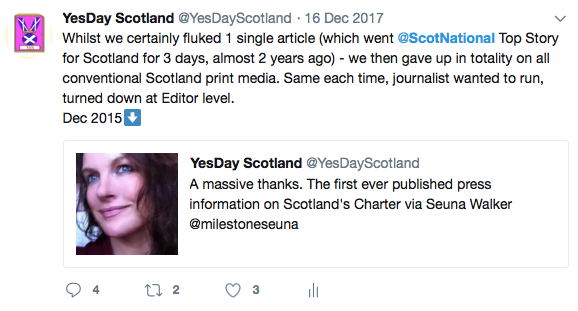
Scotland’s Electronic Democracy – Government Trials Announced!
Over the last 4 years twitter @YesDayScotland has tracked and collated articles on the evolution of direct digital democracy. It was lovely to be able to write about some of these, on Scotland’s largest business network and think tank for the future. There are truly massive potential benefits for Scotland. Additionally, that article was the first to place Scotland’s contribution for blockchain democracy into worldwide social media viral, as seen from the ‘at source’ shares. Watching it achieve top global rankings on Facebook, was quite something to behold. We know the original source share numbers, subsequent shares are incalculable:
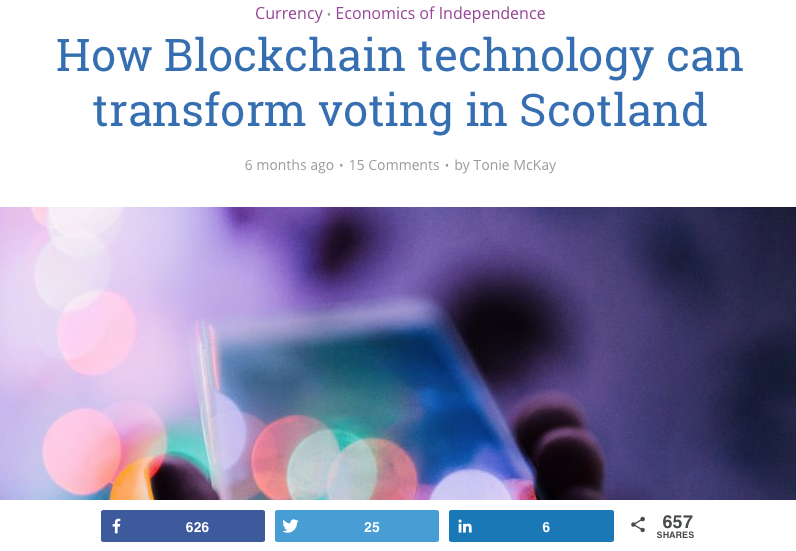
The core of our subject matter – ‘modern technology can resolve mass conflict in any digitally-literate democratic society’. Today on our 50,000th tweet, we apply that conceptual into Scotland’s Independence debate.
I write as a former finalist, Institute of Directors, Director of the Year for Scotland. I certainly confirm that this Case Study has been approached with an absolute lasered focus, befitting the subject matter itself. The content has also firstly been appraised by fellow Scots, and it’s on that basis alone, with that very specific peer approval from fellow ordinary Scots, that the information now forwards onwards to many of Scotland’s key decision makers.
Over the last few days, these are the top ranking countries for readership. It is perhaps obvious why Spain and Canada are in that mix?
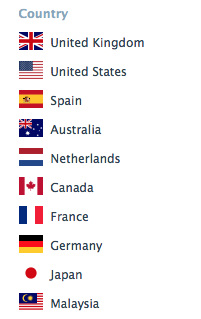
Scotland back in 2014? We saw recurring lies, hate, despondence and fear.
Straightforward. Those require to be replaced with truth, love, hope and courage.

This very real, progressive social change can be brought about in Scotland, by digital revolution. That revolution is but thought carried into action.
Digital revolution and radical change is about the need to re-evolve political, economic and social justice back into the hands of Scots, preferably through legislation and policies that make human sense.
There is now an opportunity for Scotland’s government to very carefully consider how modern era technology can be used to measure opinions in Scotland, on a national level. There are potentials for digital inclusion and democratic participation, in terms which are absolutely unprecedented.
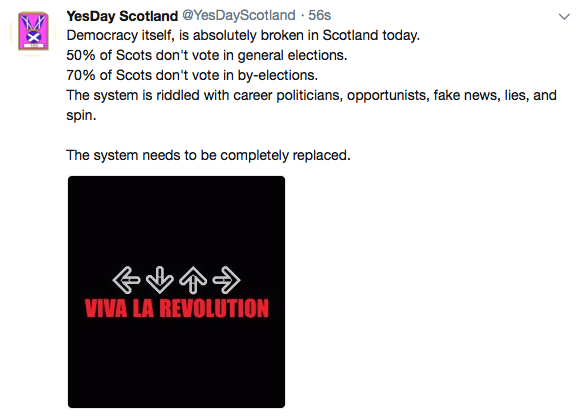
Scots today are currently 21st century citizens, interacting with 19th century institutions, via 15th century paper-based voting systems. But thankfully, all that may be about to end.

Congratulations to all involved with the key decision resulting from the newly concluded Scottish government Public Consultation on Electoral Reform. Scotland is indeed now to proceed with trials of digital voting. What a truly amazing opportunity for Scots. This is one small step for global digital democracy, one giant leap for Scotland.
But it remains to be seen however, if the forthcoming trials will be successfully and fully based upon the scope of blockchain’s capability, for all future voting for significant decisions and elections?
Westminster is now taking Scotland to The Supreme Court, seeking to remove our powers. Based upon facts and figures, and in considering the probabilities of what would or could happen with another archaic Unionist-controlled paper vote referendum, digitalisation therefore is quite possibly all that stands between Scotland and a subsequent enforced New Act of Union.
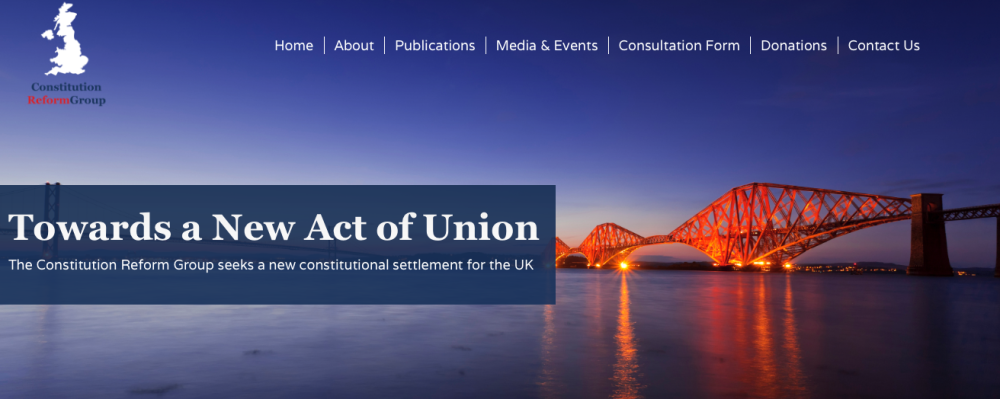 Our twitter is certainly of the opinion, based upon all parameters and facts, that another paper slip referendum could be lost by the YES side, but by digitalising another referendum (or whatever you want to call it), YES categorically has much more potential.
Our twitter is certainly of the opinion, based upon all parameters and facts, that another paper slip referendum could be lost by the YES side, but by digitalising another referendum (or whatever you want to call it), YES categorically has much more potential.
So, with regards to the Scottish government’s newly-confirmed digital voting trials, all Scots are very correct to now ask: Who, exactly, is in charge of conducting these digital trials? What is their political allegiance? Are the trials to be conducted in an apolitical way? Will the trials include Blockchain? When are the trials taking place? Will Scots be able to see the results? Crucially, are the Edinburgh University and Napier University blockchain academics involved? Is there going to be cryptography security? And so on …
Scotland now has an opportunity to develop scalable, incredibly efficient, dynamic decentralised solutions to our country’s existing social innovation challenges. This can be achieved by leveraging blockchain Distributed Ledger Technologies (DLTs).
Ground-breaking digital technology can support decentralised methods for achieving consensus on Scotland’s future. Fundamentally, in Scotland’s case this is also very much about our government providing democratic accountability.
Scotland can pioneer this new decentralised solution. There are incredible benefits for sustainability. Phenomenally-positive social change can be brought about, with brand new solutions for decentralising, as well as disintermediating processes. Scotland has absolutely incredible potential, to demonstrate blockchain viability. Solutions can undoubtedly now also enable a more even distribution and sharing of information and resources, which completely respects privacy, whilst also providing requisite levels of transparency.
Similarly, in the very process of creating change, this can also stimulate the emerging community of developers and practitioners of ‘blockchains for social good’ applications.
There are truly amazing values for the demonstrated implementation, for Scotland’s citizens, and it is stated across the entire span of society, the economy, and the environment.
Paper, or Digital? Do you want archaic paper voting controlled and counted by English Tories again? The same company (IDOX) behind the infamous and seemingly illegal Tory tallies of 2014 postal votes, which enabled the even more infamous ‘VOW’ during purdah, swaying public opinion in the last few days with promises never since delivered?
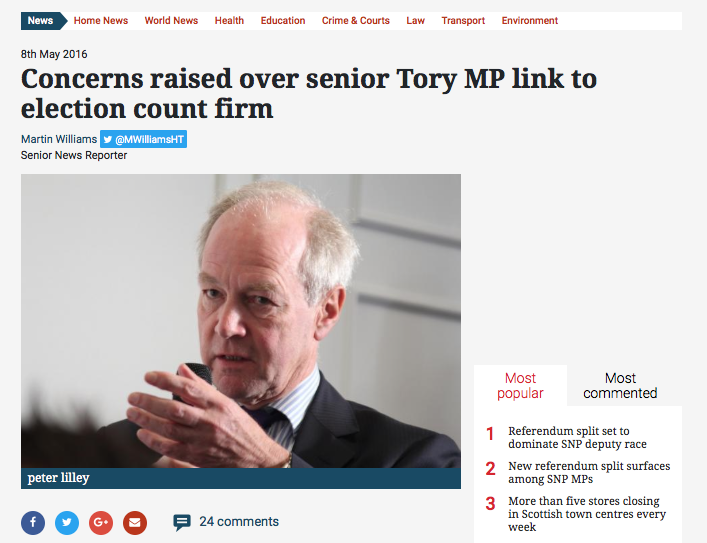
Do you wish to ever again see a situation whereby Scotland’s citizens are exposed to Tory riddles, deepening over allegations of referendum election fraud?
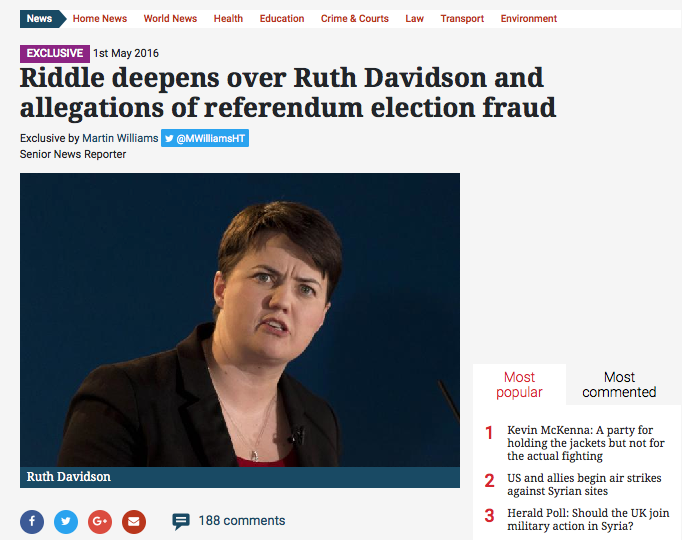
Here’s the original TV clip for those riddles.
Or do you want digital voting designed for the 21st century, by the Scottish government, with votes counted on unhackable blockchain? The chain certainly looks cool!

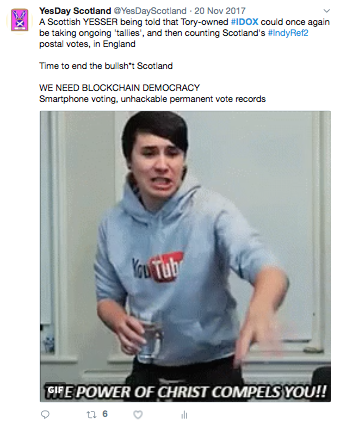
Will we see Scotland merely progressing with the same old voting booths, but using dodgy American-style desktop digital machines instead of paper? Smartmatic (House of Lords chairman) has been trying to punt these to Scotland:
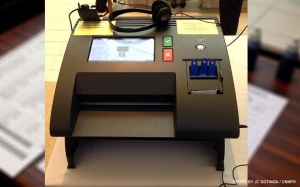
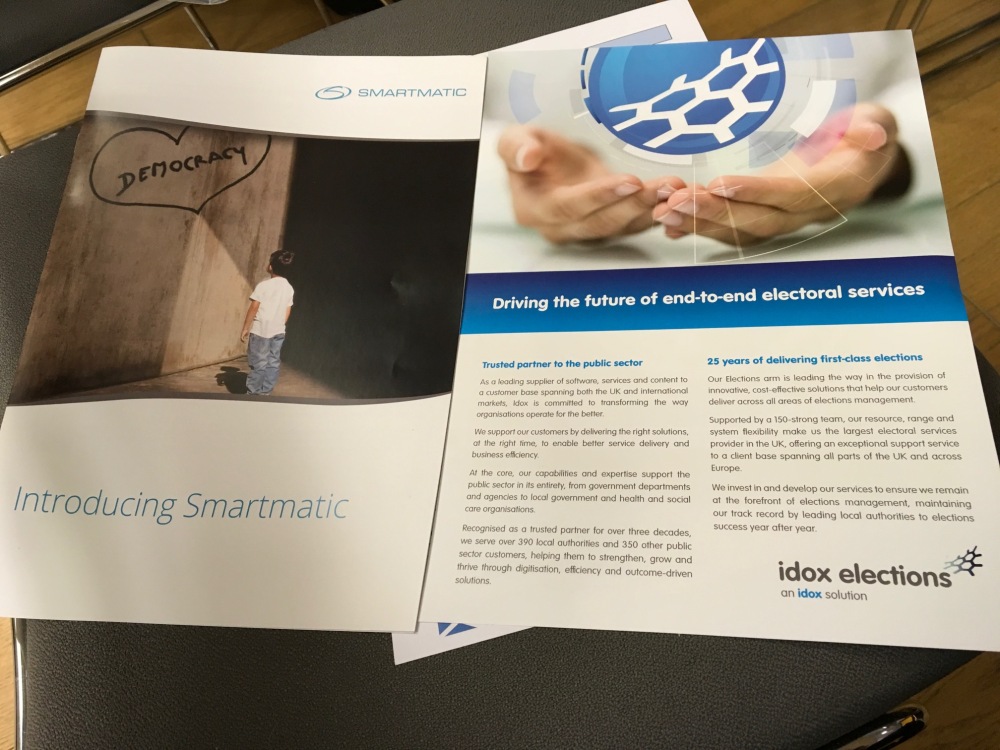
All the same old inconveniences and taxpayer expenses ongoing, once again? Or will a blockchain Scotland ditch that obsolete luddite view, and fully grasp blockchain capability for internet and smartphone voting, in totality?
Blockchain democracy, after all – is now accelerating across the globe. Both from a government-led, and citizen-led context. Hence the blocks! ⬇️
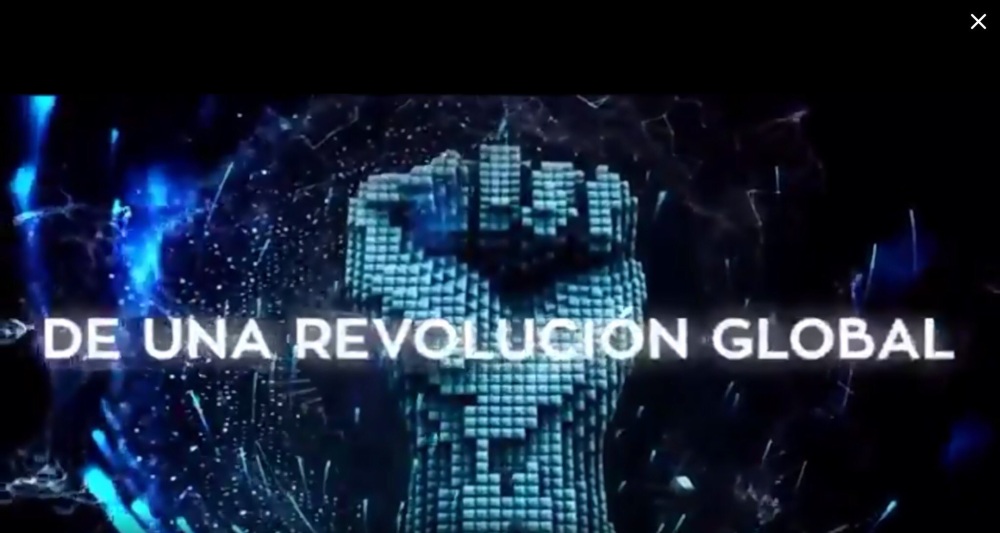
We can easily acknowledge, that a digital revolution is the struggle to the death, between the future and the past.
In a digital nutshell? Twitter chat this morning with Liam Bell, #CyberSecurity Research Fellow @EdinburghNapier ⬇️ ‘trust is distributed’
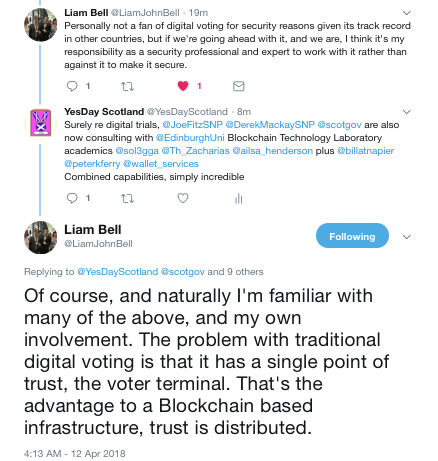
#Project1Million – THE STAGGERING POTENTIALS FOR SCOTLAND’S YES SIDE
Many of those in favour of Scotland’s Independence, are already aware that simply by shifting from paper to digital, has potential to create 1,000,000 new YES voters. That’s 22% of Scotland’s electorate. Staggering, isn’t it.
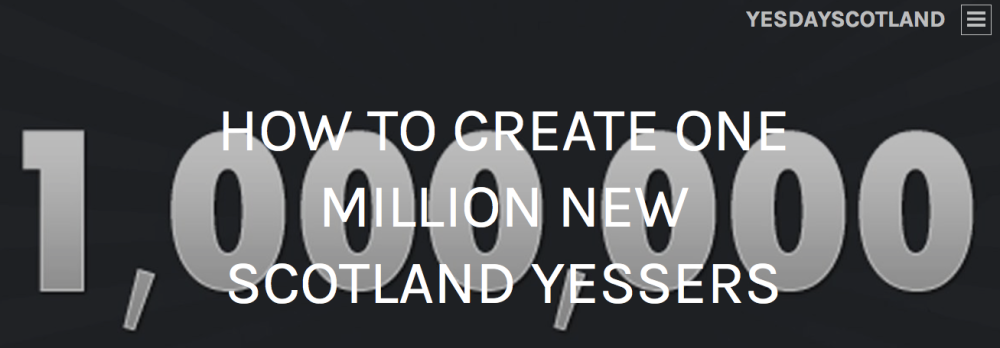
Quote, in a referendum context:

With a majority of 2014’s 800,000 non-voters demographically more likely to be encouraged to say YES for Independence digitally (via community activism), how can any YES politician support having another paper vote on anything, when there is such massive potential to increase the amount of YES voters, as well as additionally fixing so many of Scotland’s other problems, such as digital exclusion, at the same time?
On proviso that Scottish government digital vote trials are via blockchain, and they are proven flawlessly successful and fully workable, how can any crowdfunded YES organisation continue to seek crowdfunding, if ignoring digital capability with such massive potential to accelerate the YES? Similarly, and in sight of facts and figures, how can any crowdfunded YES organisation continue being supportive of retaining paper slip voting, when the Scottish government has now confirmed that digital trials are actually proceeding? Full support please, let’s look up to Scotland’s blockchain academics, and blockchain engineers, for these are the great modern era scientists who can propel civilisation up to a new level.
Based upon all accumulating facts and figures, we’d like to suggest that Scotland’s number 1 prioritised debate today, is no longer about having a referendum. It’s about switching from paper to blockchain digital, in order to have a better referendum.
From archaic paper slip voting, to #BlockchainDemocracy – fasten your seatbelts, Scotland. Say hello to the Kübler-Ross Roller Coaster: It’s a highly emotive process of change.
During the Scottish government’s public consultation on electoral reform, we saw people from archaic voting institutions in forms of shock, mourning, fight, disorientation, nostalgia, and depression. There were even others who proclaimed, noted from a London-owned and run organisation which has the word ‘Scotland’ in its title, ‘Let’s not have blockchain, the only reason we can’t have it, is because we can’t personally figure out how it works’. That’s despite all global blockchain evolution since 2008. I don’t know what the Edinburgh University blockchain professors made of that one.
We don’t even know what the Tories made of that, as they also committed to trialling digital voting some time ago. So Scotland, it now looks like it’s now very clearly down to who gets to count the digital votes. In Scotland’s case, that’s either Ruth Davidson’s chums down south, or UN Inspectors here in Scotland – take your pick Scottish government.
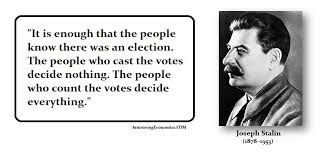
Our Case Study today, ideally shifts Scotland’s Kübler-Ross Roller Coaster of democracy, to ‘Focused study’. From there onwards, it’s over to our government, if indeed they do desire genuine progress.
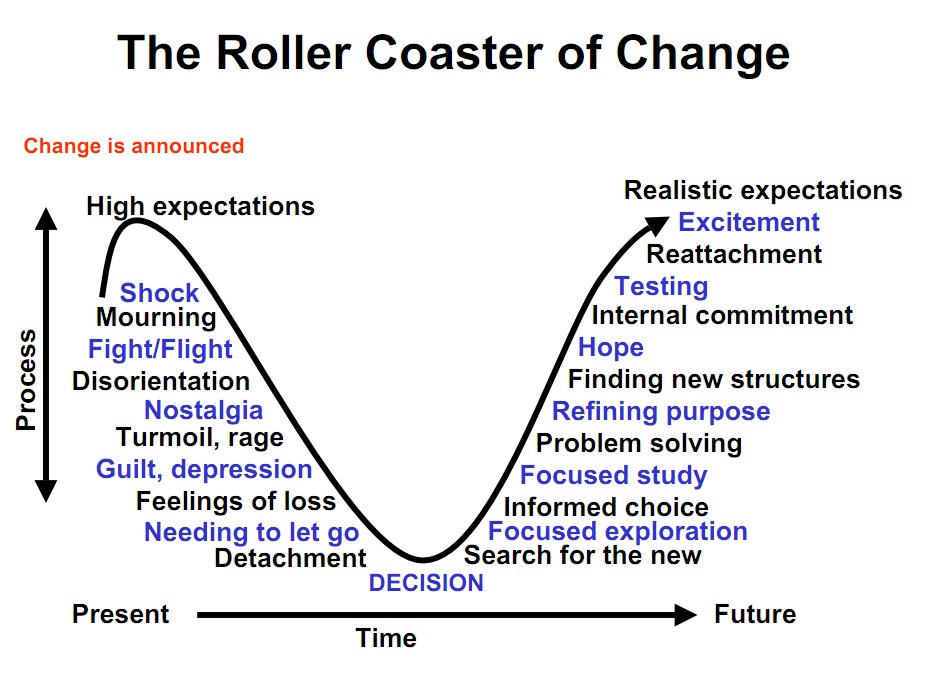
Scots deserve a better referendum? As well as helping to resolve digital exclusion, it’s certainly better from a YES perspective, if Scotland can involve 2014’s 800,000 non-voters. This means that the Indy No side, and hence the Imperialist Westminster UK establishment, will do everything possible to prevent the potentials for blockchain democracy progress.
Last year our wordpress saw over 1,000 at source Facebook shares on one article alone, when we first mentioned the scope of a blockchain-underpinned National Online Register.
Human beings obviously set out to correct decadent voting institutions! Starting with the UK Unionist-run referendum process.
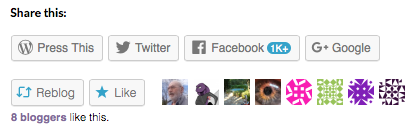
To the massive surprise of many Scots, there is apparent methodology for Scotland to become an Independent country, without even having a referendum. We have been reliably informed that Professor Alf Baird is absolutely 100% correct in all that he has outlined. However:
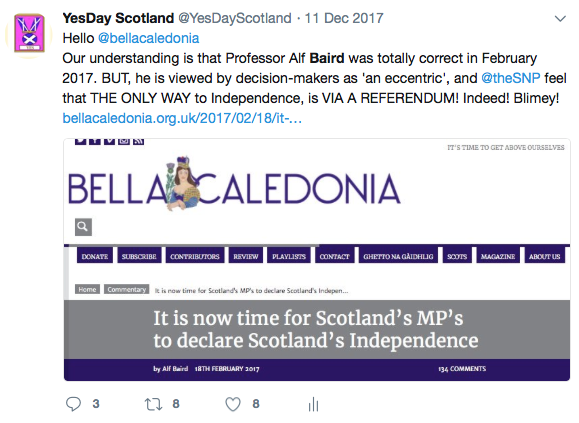
From a YES perspective, you really have to wonder why our government would actually ‘expose’ the population to any form of further referendum, when it could be disastrously lost, – WHEN THERE IS THE ABOVE ALTERNATIVE?
The lessons of history are crystal clear. Quebec’s YESSERS lost their 2nd referendum by 0.4%, and since then, support both for independence, and Parti Quebecois – has dropped. They now exist in a neverendum of division and conflict.
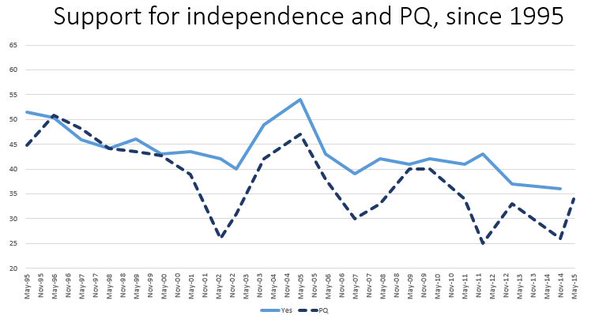
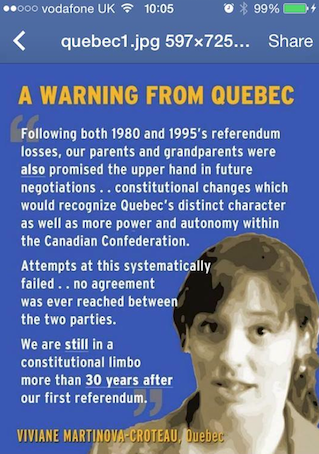
So anyway, if Scotland’s politicians now decide however, that there is unfortunately no alternative other than to have another referendum, then subject to satisfactory introductory trials, it can preferably be conducted digitally, upon blockchain systems.
It would help for a start, if the Scottish government begin by thinking of the best way to use blockchain’s information download process, to highlight the financial implications, per Scot, arising from seeing Scotland dragged out of the EU, as stated in Westminster’s papers. Furthermore, Scotland could of course choose to decide to rejoin the EU, if Independent.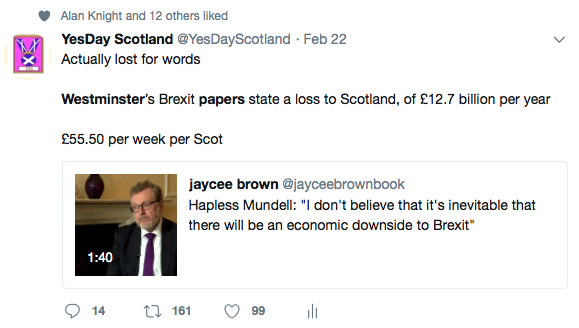

Straight to it folks, Scotland can set out on a path today, to begin to emulate the incredible digital success of Estonia, which is one quarter the size of Scotland, and is described as ‘the most advanced digital society in the world’. Since 2012, blockchain has been in production use in Estonia to protect national data, e-services and smart devices both in the public and private sector. Blockchain is a mathematically ensured cyber security technology for rapid and immutable identification of modifications in digital data and intelligent devices. Scotland can of course emulate that success. The standards have been set, it is now for the Scottish government to emulate and deliver.
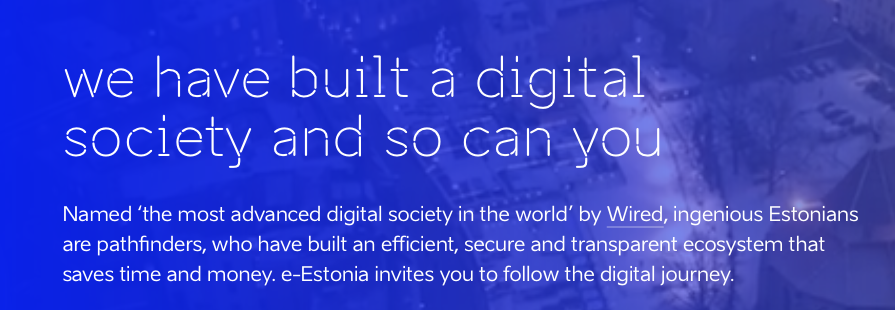
Over the last two years especially, global blockchain democracy acceleration has been quite amazing. As a further example, last year the Swiss City of Zug became the first community in the world, to offer all citizens a single digital identity, underpinned by blockchain capability.
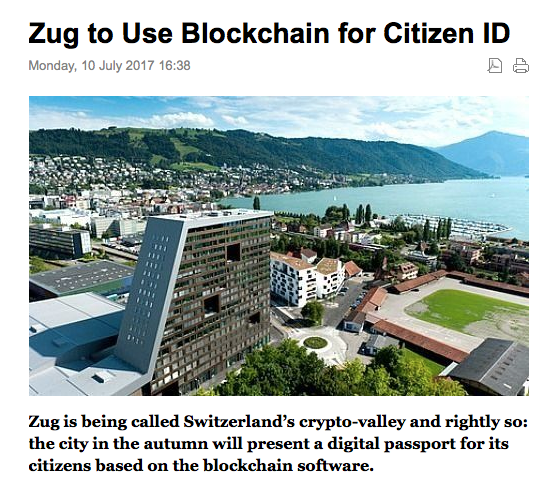
Let’s therefore hope that it’s blockchain all the way for Scotland. The potential savings for taxpayers alone, are going to be very significant. As a tiny wee example (in context), 2014’s referendum cost taxpayers £15.85M, digital can be enabled for a fraction of that amount.
Via blockchain, our future Scotland can avoid similar necessity, as is being seen in England today, for Crimestoppers UK to be placing online adverts warning voters about bribery, intimidation and impersonation, in relation both to postal voting, and voting in person.
As far back as early 2014 Judge Richard Marvey, in presiding over UK electoral fraud, warned that ‘on demand’ postal voting did not boost turnout, and had opened the electoral system to fraud ‘on an industrial scale’.
Blockchain democracy means that postal voting on demand can be replaced, by making it only available where a reason for requiring it is shown.
 Additionally, and quite unbelievably today, many Westminster MP’s are now actively campaigning for political parties not to be held to account by 2018’s new GDPR data laws. That, is staggering. Dear Readers, Scotland needs every possibility ahead, to be able to use blockchain’s ability to underpin democracy, with facts and truth.
Additionally, and quite unbelievably today, many Westminster MP’s are now actively campaigning for political parties not to be held to account by 2018’s new GDPR data laws. That, is staggering. Dear Readers, Scotland needs every possibility ahead, to be able to use blockchain’s ability to underpin democracy, with facts and truth.
Clarity for a Times columnist:

In the interests of truth, Blockchain must be used, to tell many blissfully unaware Scots, that all 37 of our daily and weekly newspapers are owned and run by Unionists. The National, and The Sunday Herald have a facade of being proIndy, however they share the same Glasgow office, and same ownership as the uber-Unionist Glasgow Herald. All three publications are owned by Newsquest (Headquarters Weybridge – on the outskirts of London), and Newsquest in turn, is owned by the institutional shareholders of Gannett, which is American.
Any contribution made towards Independence by any publication which is either fauxIndy or proIndy, is welcomed by YESSERS. But Scots need to understand the roots of mainstream media ownership.
There are journalists doing the work of UK Unionists, for American-owned Scotland fauxIndy newspapers. It is somewhat confusing, until you understand that both proIndy publications only really exist as such, to try and make money from Scots.
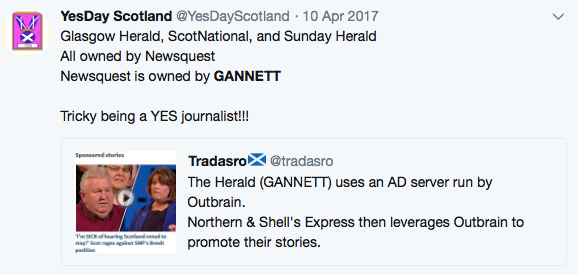
Twitter knows the score, EXACTLY! But so many Scots simply have no idea.

Scots must also now create totally new systems to counter the social media perils of targetted online adverts and psychographics. Education via modern technology and blockchain information pack downloads as part of the future voting process, is only one answer to those many new challenges.
With regards to political parties buying results, future Scotland blockchain can define visible records of permitted political party spending.
As at today, there are hugely serious unanswered questions as to the level of involvement which Cambridge Analytica (or any of their derivatives) had in Scotland’s 2014 referendum, if indeed any? It is categoric that their company began in 2013, and investigations now appear to be underway. With each emerging revelation, weight is added to the argument that Scotland’s independence referendum was influenced, similarly to Brexit.
There is however, absolutely no doubt that 2014’s No side used Cambridge Analytica-style tactics, with their so-called ‘Patriot’ system. Those who orchestrated and campaigned for a No vote in Scotland’s independence referendum devised the most sophisticated targeting of voters seen in British political history. Scots were “linked” to activists of a similar age or with similar social media friends. This extended across the span of peoples’ smartphones, tablets and PCs.
For more information on the No side’s 2014’s ‘Patriot’ capers, let’s acknowledge the Auld Alliance and head on over to the French Journal of British studies.
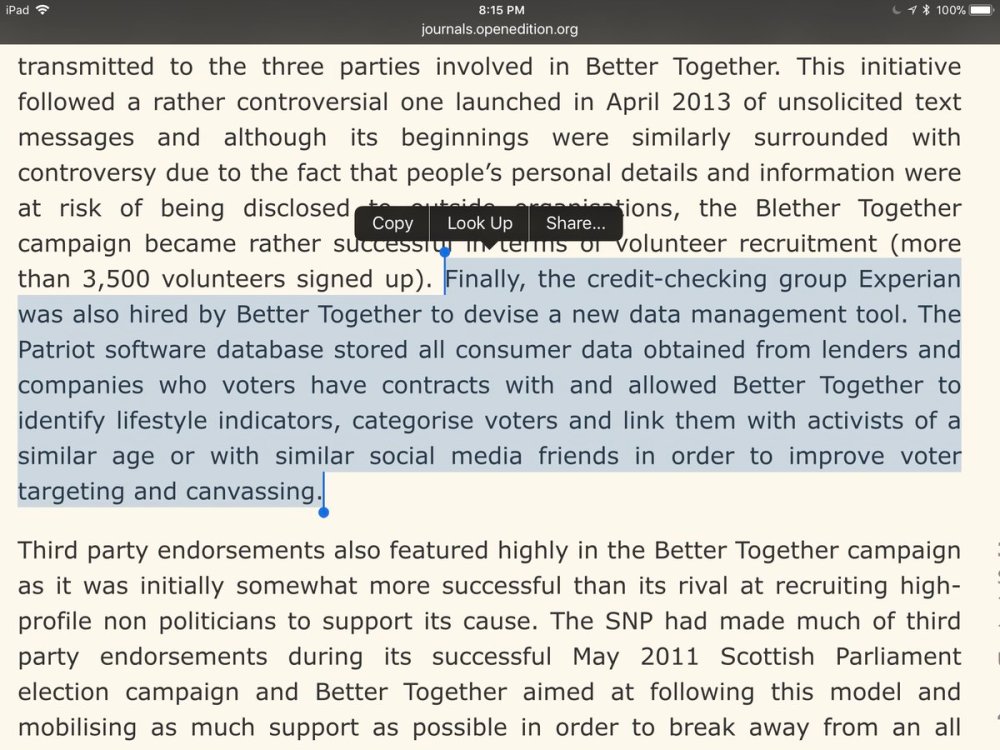
It is indeed a strange mentality, for any Scot to have previously named something ‘Patriot’, when Patriot has served as the very opposite, of what being patriotic actually is. That’s the same as listening to a 2014 No voter proclaiming that they voted No, because they feel Scottish.
So again in these contexts, by shifting to blockchain’s online information packs, this will massively reduce existing political spin. Let’s discuss the truth please, Scotland.
Given what Scotland’s citizens have been subjected to over recent years, it is clear that the digital democracy revolution has great capability to be a dictatorship of the exploited, against the exploiters.
The digital democracy revolution, most importantly, can be a revolution in sentiments, manners and moral opinions.
For citizens to have confidence in elections, the electoral processes must be secure, anonymous, and verifiable. Blockchain’s electronic democracy can certainly satisfy those aspects.
The incredible Blueprint digital overview is new to Scotland
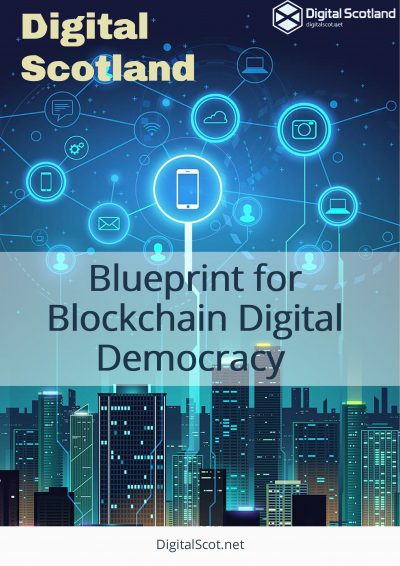
Technologist Neil McEvoy is the author of Scotland’s Blueprint for Blockchain Digital Democracy. Having arrived back in Scotland, from Canada in summer 2017, Neil has also set out the scope for how Scotland now has capability to become the world’s leading digital country, never mind the world’s leading digital democracy! Digital Scotland has been newly created as a volunteer community network for building a world leading Scottish digital nation. It has a simply breathtaking vision for Scotland’s future place in the world. Ambition, beyond belief – and all of it outlined as being realistically attainable. So what are we waiting for?
For sure, the wheels of bureaucracy turn slowly, and in Scotland’s case for democracy, today’s systems are centuries old. What we need now, is ACTION from our government.
Passion is needed for great work, and for the digital revolution, passion and audacity are going to be required as well.
And as advocated by the academics from within the Edinburgh University Blockchain Technology Laboratory, relevant blockchain-specific trials are certainly required. The pilot trial processes require to demonstrate absolute trustworthiness and unhackability, with a national perspective.
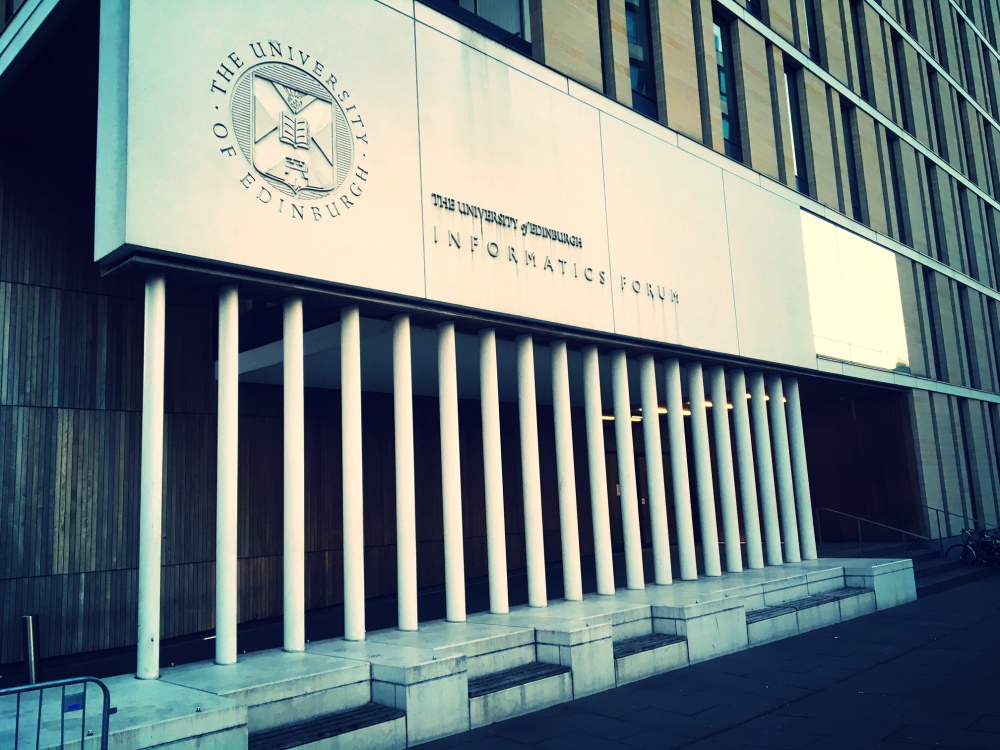
Following the November 2017 launch of the government public consultation on electoral reform, YesDayScotland had yet another world exclusive, in that we were the only media source to liaise with Professor Kiayias, the director of the Blockchain Technology Laboratory at the University of Edinburgh. ‘The process takes … ‘

I’ve thought a lot about what I saw that day. There were 140 attendees, and I was live tweeting the progress. Archaic voting institutions all around, literally astounded into silence, as the academics talked through their ‘beautiful solution’. Many attendees were clearly hearing of blockchain democracy for the very first time. People were also realising that their working roles were about to be rendered obsolete, and the survival of their institutions was at stake.
Something very VERY important. At no point that day, was the word Independence even mentioned. The academics were only focussed, on highlighting the potentials for the very evolution of democracy itself.
It was patently obvious that they are driven, absolutely and simply, to see how technology can make the world a better place. And there’s a difference between sparkle, and twinkle!
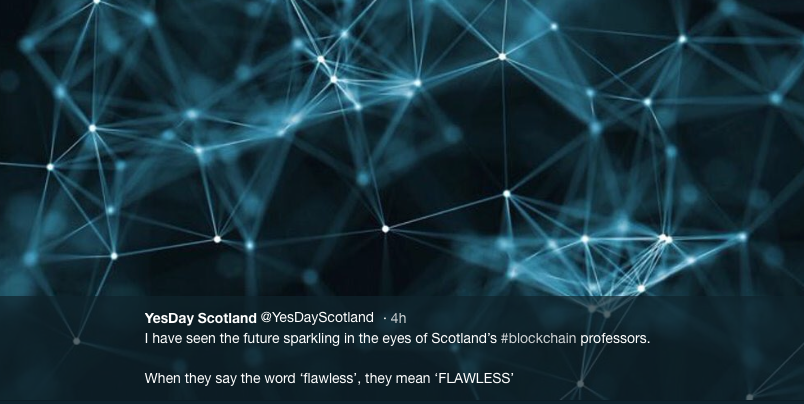
Well, as we all know. Money makes the world go round.
That Informatics event, began without blockchain even being on the agenda:
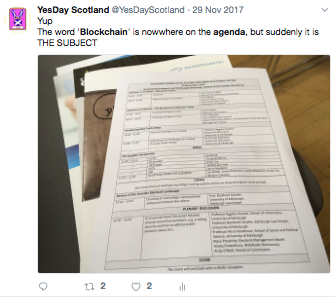
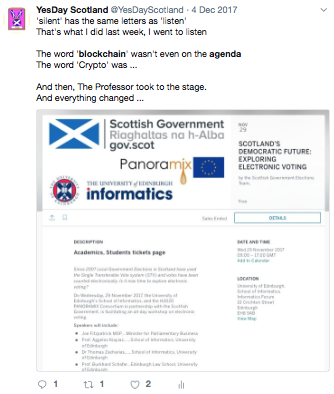
Considering the evolution of digital across the UK in 2017, look what happened to the share price for IDOX, the company that took tallies of Scotland’s 2014 postal votes. You can actually see the price stuttering all year, and then falling off a cliff in November 2017. Market value reduced by circa £60,000,000 …
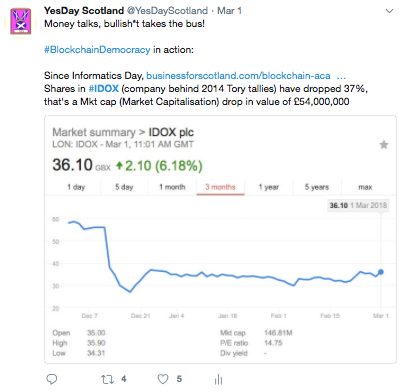
Then it got worse.
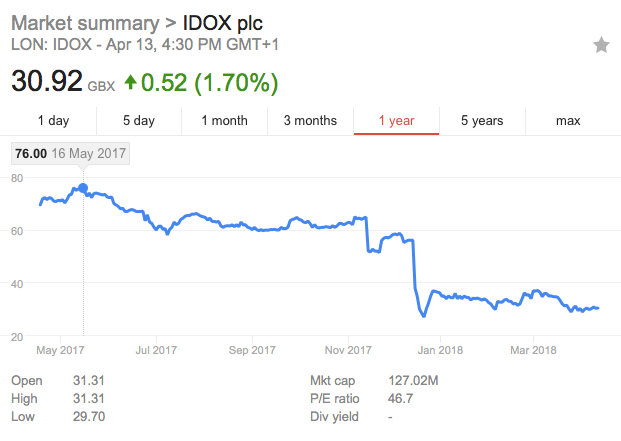
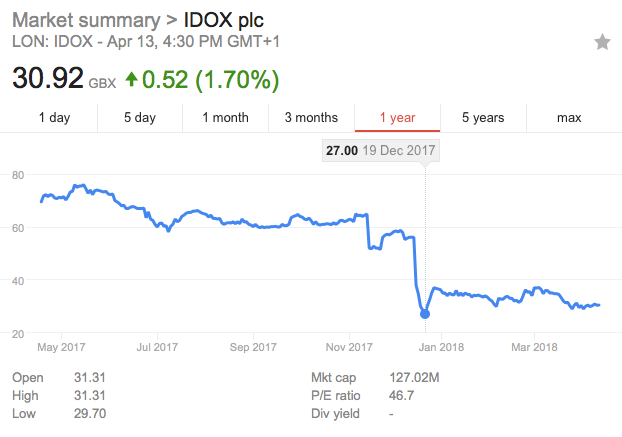
The digital democracy revolution has also clearly emerged where it was least expected by Westminster’s proposed Empire 2.0, in a hemisphere where Westminster has previously been used to acting like an all-powerful master. That, can be terminated.
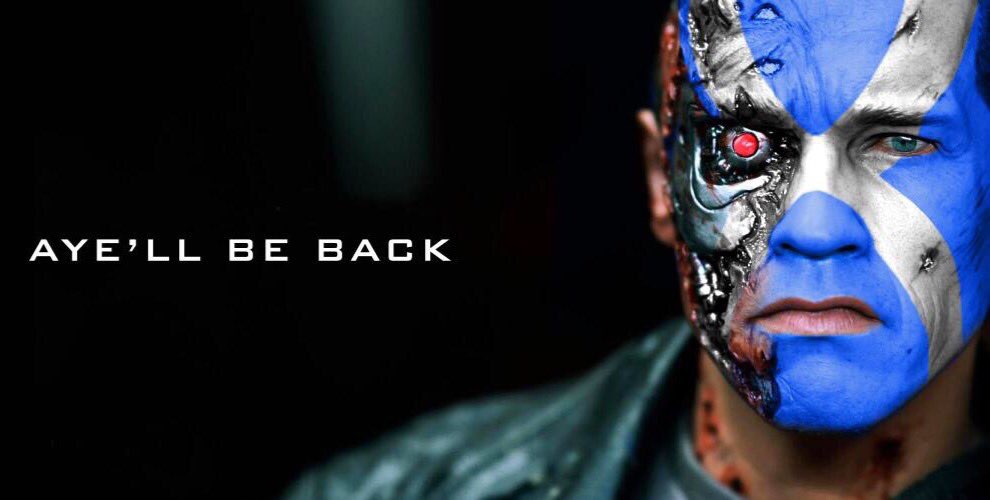
When you begin to understand what #BlockchainDemocracy was initially up against, you then begin to understand why you still cannot read about it, in any Unionist-owned newspaper.
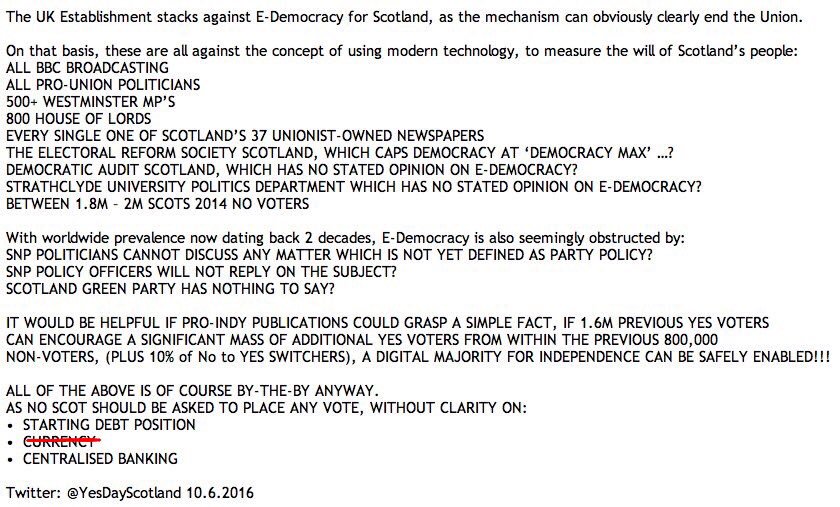
No apologies on our twitter feed, to the architect of 2014’s ProjectFear, for the capitalisation. We were shouting!
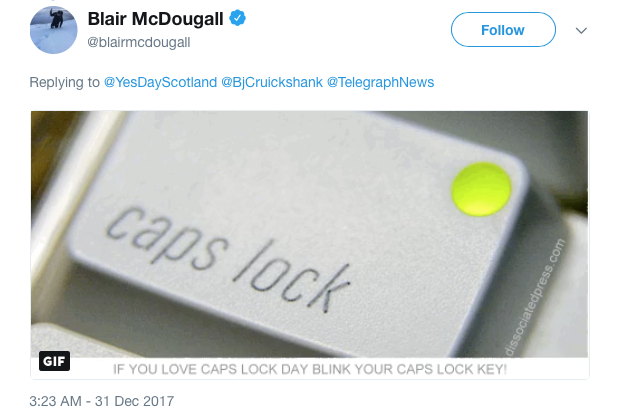
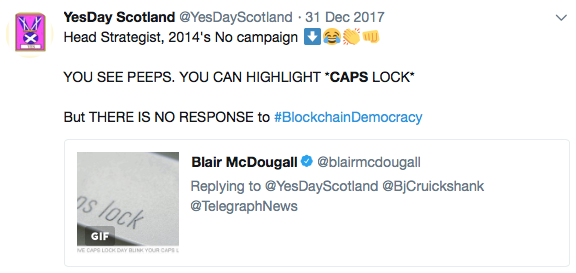
We do not even know today, IF the Scottish government digital trials will categorically extend into the use of blockchain? Because nobody from the government has even confirmed that yet.
Are we of a mind, to see Scotland snatching democracy defeat from the jaws of digital blockchain victory? Let’s hope not. We underline again, the November 2017 government documentation for the Consultation on Electoral Reform failed to even mention ‘blockchain’, or ‘cryptography’.
Here’s one of our previous Business for Scotland articles – And as Edinburgh University blockchain professors and academics have defined a new future for democracy in Scotland, it may as well be put to proper use!
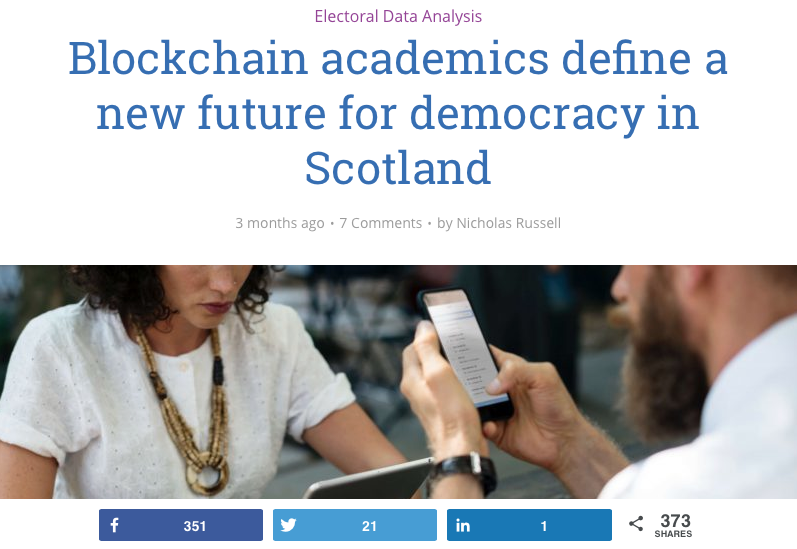
Such electronic democracy will only work for our future, if it’s fully piloted and trialled, regulated, then completely inspired and led at Scottish government level. In the meantime, everyone in Scotland, most especially those who have been in any way sceptical about the digital potentials, would be well advised simply to be cool. Let’s all await the results of the trials. Be very cool! It is absolutely certain, that our government will not proceed with any flawed methodology when it comes to future voting. Any doubt whatsoever today, is understandable, given many global ‘issues and problems’ with digital voting, acknowledged however – those problems were before the introduction of blockchain capability. So, it’s up to those working on digital trials, to provide the evidence which delivers to requisite flawless, thus providing all voters with the required comfort. Full support for all involved, all involved are doing their utmost to provide our nation with the world’s best democracy.
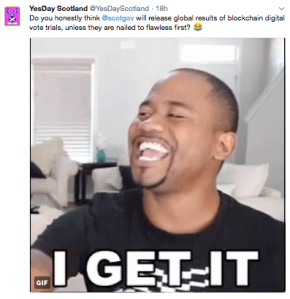
Noted, as the founding leader of Scotland’s new Westminster MP Blockchain Group, Martin Docherty-Hughes is very keen to initiate trials within the constituency of West Dumbartonshire. Martin is now finalising the first ever MP article on Scotland #BlockchainDemocracy, phase 3 in our Business for Scotland trilogy.
Not that you’ll be able to read about anything such as this elsewhere in any of Scotland’s newspapers, as they appear to have decided that the digital trials for democracy, are not newsworthy.
Generically-speaking, Edinburgh University, ourselves, and WebRoots Democracy, is all:
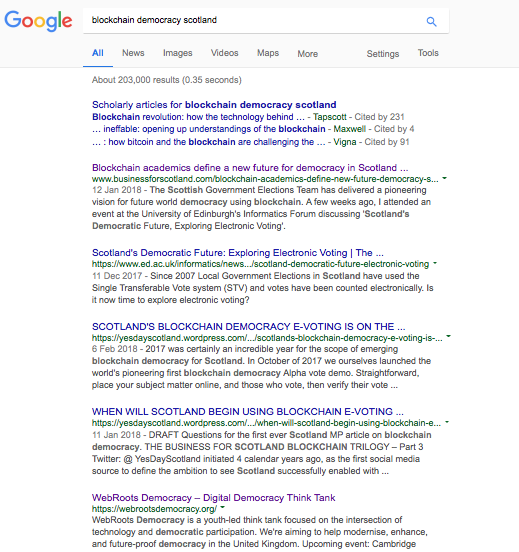
If you drill into ‘News’ itself, blockchain is mentioned in one single newspaper, once. Last year!
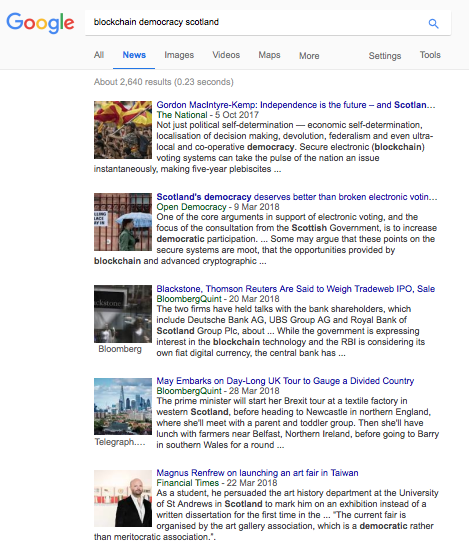
If you consider blockchain democracy with global perspective, well where to even begin? Take your pick from 1,680,000 results! After you’ve done that, if you search for ‘blockchain vote’, you’ll have nearly 8,000,000 choices! Mass global acceleration, with capability ignored in totality by Scotland’s media. Maybe they think it’s simply going to go away?
Well, as every Scotland digital revolution has its counterrevolution, that’s a sign that the revolution is real.
Scotland doesn’t need mainstream media. After all, 45% of us took part in the 2016 National Survey, – the biggest political survey in our history, with virtual zero media coverage for the entire 3 months. 45%? Yep, that’s a line of folk 1,200 miles long.
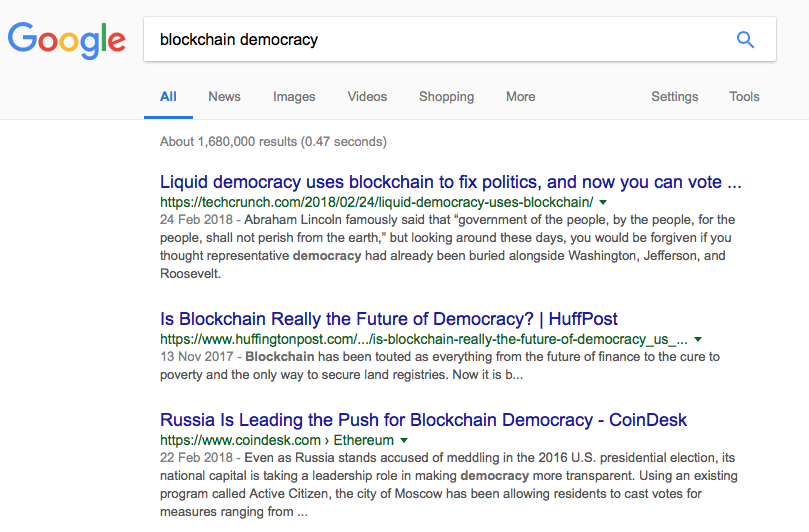
YesDayScotland conducted initial successful blockchain democracy trials as a global first last year – 2,012 participants, flawless 100% success.
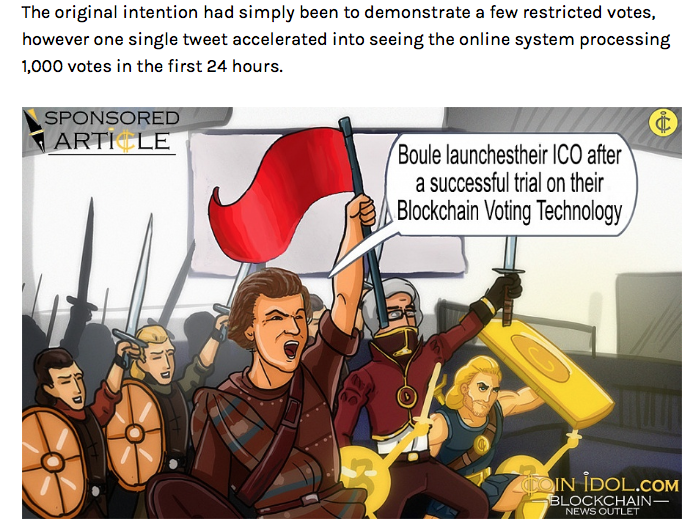
DO YOU WANT SCOTLAND TO BECOME AN INDEPENDENT COUNTRY? Noted, the 100% success, was based upon 100% success in using a blockchain-underpinned system, to allow people to place, AND THEN VERIFY, their opinion.
The 98% YES result, was merely by-the-by …

Think very simplistically indeed of future blockchain democracy in the same way as participating in online newspaper polls. The difference is, you are using a verified identity, to participate.
Ongoing trials now need to be rolled out across Scotland, in much bigger contexts, through government departments.
All of our most mature voters already have a Saltire (NEC) National Entitlement Card, each with a unique digital number. Some 650,000 of our youngest citizens already also have the same entitlement cards. Pilot trials can therefore initiate soon, for all those cardholders who are legally entitled to vote.
Plans are already in progress which will have capability to issue national entitlement cards to all Scots who do not yet have one. That timeline is defined for early 2019, potentially sooner, if fast-tracked.
The pilot trials can reintroduce citizens to the expressing of online opinions, already so successfully previously defined, and to repeat, with more than 2,000,000 citizens (45% of the electorate) having taken part in Scotland’s 3 month long 2016 National Survey. In passing, we have been reliably informed that it delivered a 62% YES for Independence.
That exercise was run without interface with the electoral roll. And noted, that previous online survey was run by the SNP party. Future blockchain democracy needs to be run by the government.
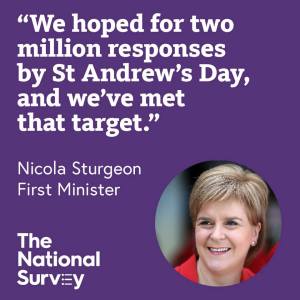
Most Scots today however, won’t even familiarise with the word ‘blockchain’ – they’ll simply grow accustomed to the process of online participation. As easy as taxing your car online.
The Scottish government trials of blockchain digital democracy, do not need to initiate in the political sphere. At outset they could, for example, be used to ask to use Scotland’s OAP ramblers, for their opinions on rambling. They could be used to ask Scotland’s 16 – 18 year olds for their opinions on the future of cycling infrastructure in Scotland’s flat cities. Most Scots have no idea that in Copenhagen, which is viewed as one of the world’s happiest cities, 37% of Danes cycle to work.
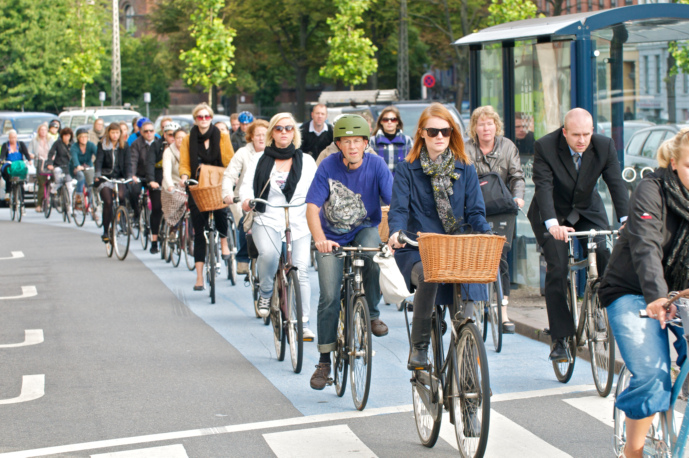
Extending into politics, initial trials can for example, perhaps begin to ask for opinions on matters such as 16 year old voter eligibility, the scope of future guaranteed citizen incomes, and aspirations for future pension levels. Scotland’s pensions today, are among the worst in the developed world.
Many Scotland OAP’s do not know the historic pension comparison circumstances.
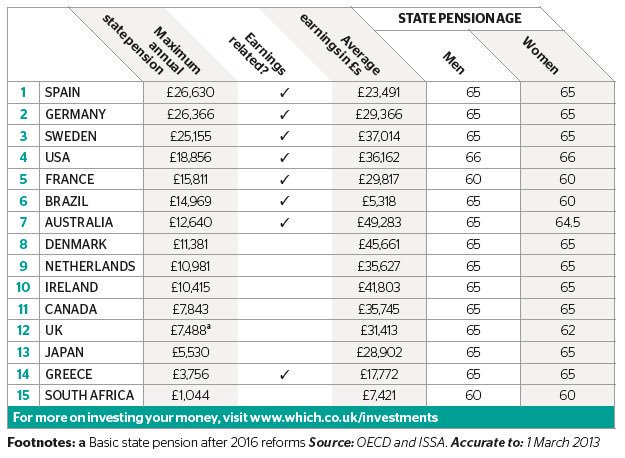
Unlike the generality of previous archaic paper voting, this new era gathering of opinions is based upon zero bias online factual information, provided as part of the participant experience. The factual information can be determined by Ethics Committee.
We would suggest, on the strongest possible terms, that in addition to the Scottish government digital trials, Scotland’s SNP and Green Parties should now run their own blockchain trials, within their own memberships. These could be used for example, to gather opinions on the actual question wording, and framing of that wording, for future national opinions on matters such as Independence, the EU, and Trident. Underlined, questions can be non-binary.
Electronic democracy can potentially be used for national elections, referendums, and ongoing gathering of national opinions.
There’s actually only one argument left, for working with a paper slip referendum, and that’s ‘voter familiarity’, with the process itself.
So, how could electronic democracy now work instead, as a better alternative?
The concept of having a referendum ‘once in a political generation’, is rendered obsolete by new technology’s ability to more consistently measure public opinion, on a regular and ongoing basis.
By introducing blockchain’s effective, democratic and accountable decentralised capability, this will certainly mean a very significant element of disruption to the current outdated systems.
On an ongoing basis, blockchain also has very obvious future question capabilities, across the entire span of evolving society.
For example:

Scotland would do well in the meantime, to take a moment to think about how best to involve the half of our population who do not currently participate with voting within general elections. Change is certainly required.

There are two huge advantages pertinent to Scotland, for switching from paper voting to digital. Firstly, an opportunity to improve our society and culture, by increasing digital inclusion. Secondly, scope to accelerate democracy itself.
Scotland’s government needs to define exactly how they will create new measures to help solve digital exclusion, and then they need to fund and sort those solutions. Digital inclusion can improve people’s quality of life, social cohesion, future innovation, boosting economic growth and allowing for more effective delivery of public services.
It is also very easy to see, how by accelerating with digital democracy and incentivised educational blockchain, Scotland can gradually become a much more equal society, a country within which inclusion is prioritised, and ALL citizens feel that their opinions are fully valued.
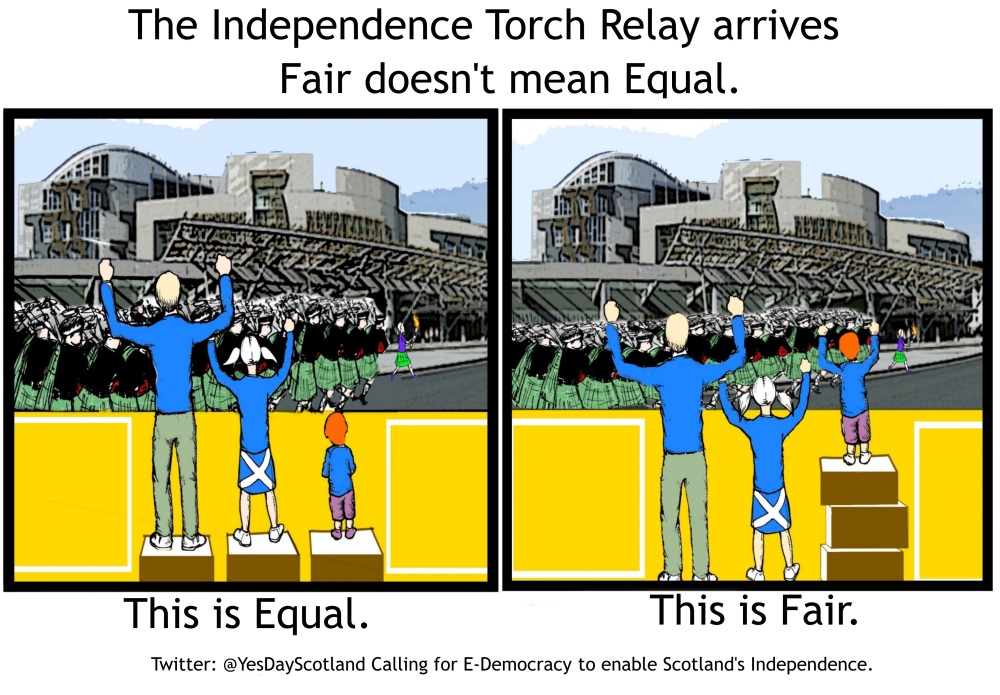
Could the Scottish government radically initiate, by providing smartphones to all Scots who cannot afford one? Why not, given the future benefits for public services?
Or as my 14 year old daughter Isobel came up with last night:

Under existing Estonian proposals, citizens are to be financially rewarded in crypto, for services to the e-resident community – that’s another dimension compared to where we are in Scotland today. Just imagine a tiny wee tax discount, enabled if you participate in all future democracy! Hey, maybe our government should even make voting compulsory, the same as it is in Australia! Trailblazers!
Using the combination of blockchain electronic democracy and community spirit in a referendum process however, much of that inclusion process can also certainly be organically-driven, by people. Scots being who we are, it is in our nature to seek to bring progress via voluntary input, holistic inclusion, and kindness through common wellbeing. There will be wonderful opportunities to increase success with these aspects. Scotland’s YES side is phenomenally-accomplished at door-to-door campaigning.
As at 2015, studies suggested 80% of Scots were digitally enabled. We’d do well to take digital lessons from Scandinavia. As one example, Norway already has 96% digital inclusion.
YES! Our Highlands and Islands do have public libraries within which there is internet access. But not all towns have libraries. Plans really do need to fall into place, to help remedy the entire overview of Scotland’s digital exclusion.
Following successful digital vote trials, there will be choices. Scotland could have a 1 month digitalised referendum, the same timeline previously used for postal voting. The timeline could be further extended at outset, for 2 or 3 months.
Alternatively it could become a much more more relevant alternative, simply to totally dispense with ‘the notion of referendums’, and use blockchain democracy instead, in the form of multiple month National Surveys, equating as Online Registers of national opinions.
Seemingly, Scotland apparently requires permission from another country, in order to ask Scots for their opinions on independence? That’s life today, in a modern era colony. It’s seemingly in the form of a Westminster section 30 order. The current UK PM said, ‘Now is not the time!’
Is Scotland a colony? Dictionary definition below, you decide!
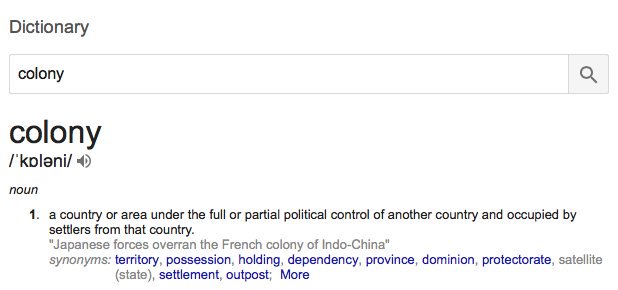
Westminster’s actions ignore the fact that every people has a United Nations right to self-determination.
There is a compelling moral argument not to have any referendum, and use another form of creating an independent country, because:
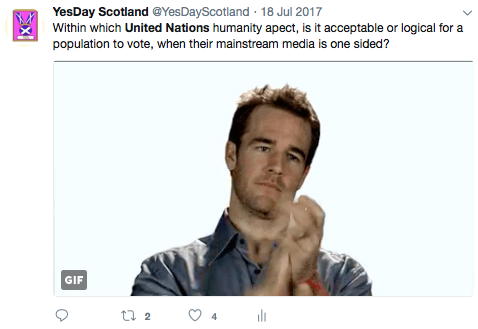
But we highlight:
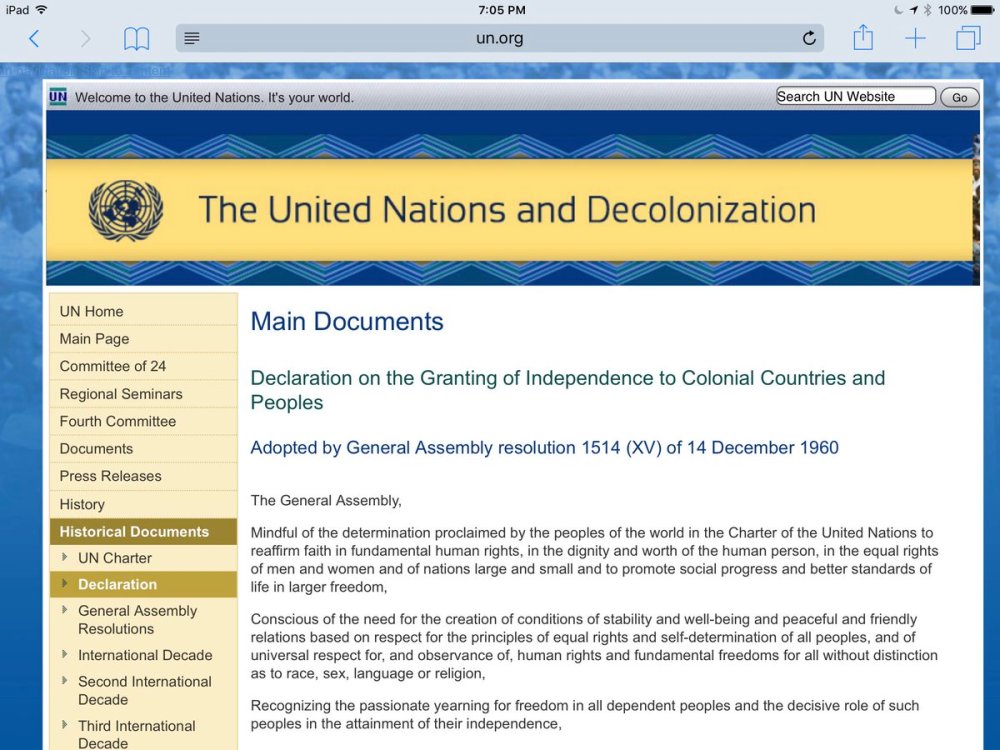
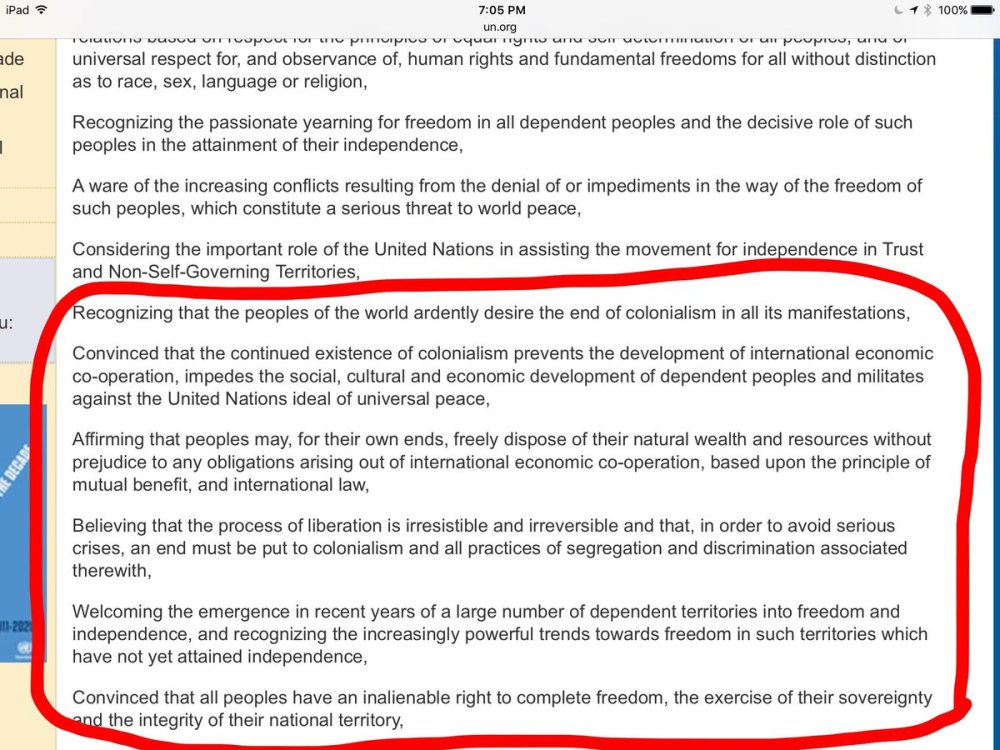

Whatever your view therefore, on Scotland needing a Westminster section 30 order, it’s crystal clear that Scotland does not need anyone’s permission to use blockchain democracy in the form of a national Online Register of opinions. All that’s happening, is that opinions are being measured. A defined population majority in favour of Independence however, would then legitimately underpin the logic in convening a National Assembly in Holyrood’s Parliament, for formalising a Declaration of Independence, methodology which has been used by many other countries previously.
Certainly, and if it is possible to do so, to define a population majority in favour of independence, would be preferable for future population happiness.
Blockchain also offers scope to allow participants to change their opinions on an ongoing basis. Simply put, a website to collate opinions. If there are visible statistics, people can also place tentative votes, based upon public sentiment. Or as it’s technically referred to, End to End verifiable voting. With regards to Independence, significant amounts of 2014 No voters subsequently regretted their No votes, based on the aftermath of recrimination, division and social media anger. Using blockchain, Soft No’s can still place a No vote, but switch to YES if that’s where public sentiment is heading.
In any event, the Scottish government probably now needs to assign the creation of the future blockchain platforms, within Scotland. There are indeed many global blockchain democracy platform providers, but Scotland’s blockchain business really surely needs to be totally newly constructed and taken care of, right here in Scotland? And then bridges need to be built through old systems, until the new system renders the previous one obsolete.
I had a conversation in November 2017 at Edinburgh University, with Rab Campbell, chair of Edinburgh’s WalletServices, who are the (2017-appointed) Scottish government blockchain public infrastructure partner. Talking future democracy, Rab was of the opinion that Scotland’s underpinning should probably be built upon the blockchain platform known as Ethereum.
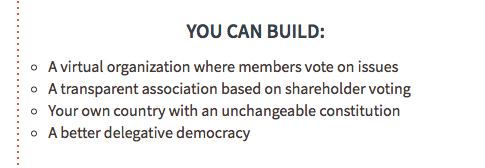

Future blockchain platforms can become iconic technological marvels, befitting the reality of their status, and resonating with global pioneering democracy innovation.

Blockchain’s corrective technology can fortunately also help to undo the negative impacts of previous lies, spin, ‘dark ads’ and fake news.
Platforms need to be so trustworthy, defined, and so simplistic, that the core of democracy movements will self-motivate with accelerated community activism.
And who should be permitted to participate? Is it relevant for overseas residents who retain a primary Scotland address, but do not actually retain primary residence here, to be permitted to participate? That is of course, a government issue to define.
National funding, can extend awareness to also include national billboards, TV support adverts, and so on.
Applied to blockchain for example – for those who participate with significant national decisions, digital systems can also be easily created so as to issue individualised and numeric souvenir digital certificates for all participants.
So, what features should be included?
15 KEY ARCHITECTURE STEPS FOR FUTURE ELECTRONIC DEMOCRACY
In the way that iPhones are now heading for version 8 and, onwards with Limited Edition RED (with studio-quality portrait camera), that same consideration applies to how blockchain democracy technology will continue to evolve.

Whilst blockchain is where it’s at today, the evolution of technology itself is already looking to the further future. Take a look at – ‘The first effective, democratic and accountable decentralized political platform’ – direct and clean relationship between voters and representatives.

Today’s blockchain capabilities work with numeric citizen ID numbers. Scotland’s only current equivalent relevant numeric ID, is what is currently known as ‘the bus pass’ – Saltire cards.
Moving ahead, blockchain will begin to see ability for citizens to create their own Sovereign digital identities. Globally, 1 in 6 people have no identity, but many of these have smartphones. The digital revolution is more significant than the invention of writing, or printing.
The next future phases of government-led blockchain will extend into having citizen identities confirmed at government level, additionally using Biometric facial recognition. It’s the same type of technology already in use at Edinburgh airport’s passport control. If you have a new biometric ‘chipped’ passport, you can use the automated ePassport gates instead of having your passport checked by a Border Force officer. But Scotland doesn’t need that in the meantime, citizen ID numbers and electoral roll interface, is all.
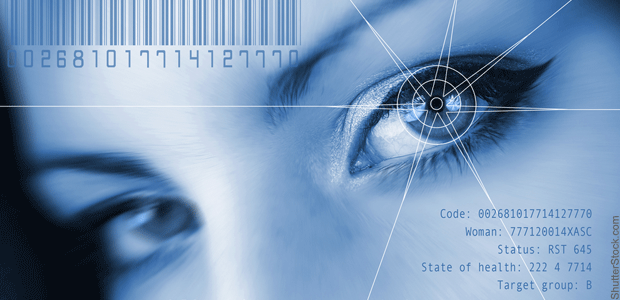

So, what we’re looking at isn’t the necessity for a one-off technology circumstance for a referendum. We are looking at the entire underpinning for a totally brand new digital democracy, with capability to continue to embrace each new phase of ongoing progress.
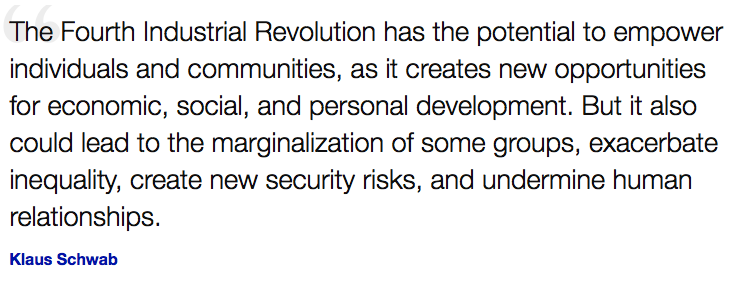
CALLING FOR A NEW SCOTLAND GOVERNMENT DEPARTMENT. On that basis, Scotland’s government firstly needs to finance and create a brand new government department, to physically implement, oversee, and then continue to evolve all direct democracy technology.
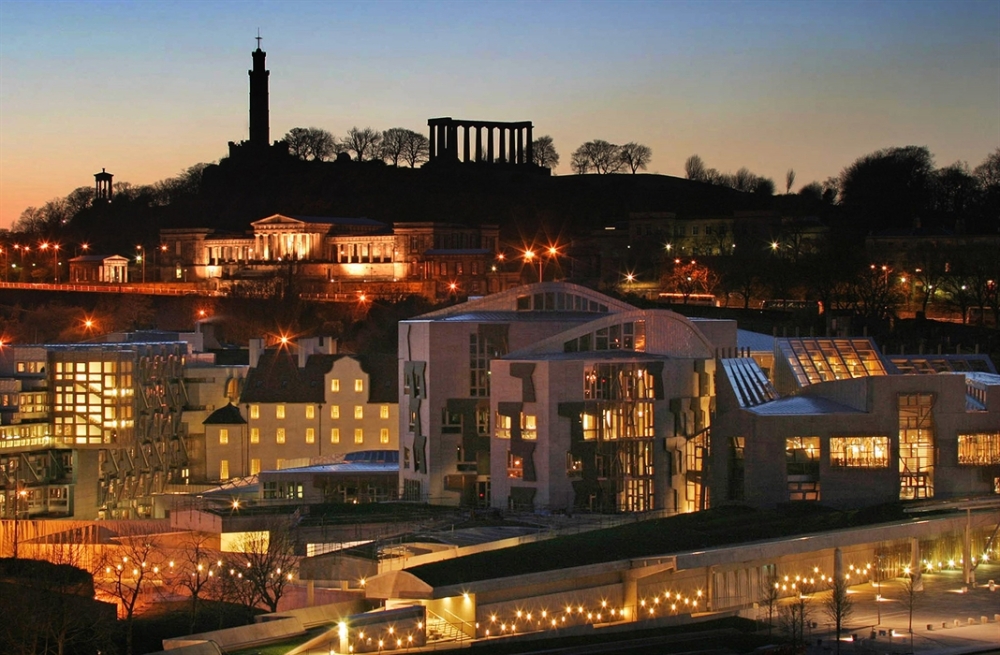
Individuals need to be assigned key roles in that new department. The department itself, is the key driver for Scotland’s entire new future.
The department must stand up for Scots, against mainstream media bias. Let’s get the truth out into mainstream Scotland. Education is the key. As an example of how the current BBC Scotland UK state broadcaster operates: LONDON CALLING: BBC bias during the 2014 Scottish independence referendum
We must additionally realise, that what now happens in Scotland, can serve as a future inspiration with a massive global resonance. Technology can resolve mass conflict, let’s show the entire world how it’s done. After all, Scots are already renowned as global inventors of progress. So let the blockchain engineers get to it!
If we reflect upon the truly horrific events which unfolded on Oct 1st 2017 in #Catalonia, think of the physical and emotional scars, on all sides of the appallingly sad conflict.

We can only dream today, of an eventual political solution, which will also allow those citizens to decide upon their future as well. In a referendum context, it’s a similar situation to Scotland. If Catalonia does have any future referendum, many of the considerations set out in this case study today, would come into play in a paper referendum process. Returning to voting booths could however be relevant on the basis of pride in being able to vote, but blockchain technology could offer further dimensions. Or they could do what Sierra Leone has just done, as a country with only 2% of people digitally included!!! They used paper slip votes at polling booths, then partially transferred into Swiss Agora blockchain records? Let’s leave the people of Catalonia to figure all that out, that’s their decision to make.
Either way, we hope that Scotland can move ahead to fully showcase a modern era democracy, which can then help to resolve mass conflict elsewhere in the future world.
Could Scotland eg use Agora for paper slips and subsequent vote records? YES we could. But it wouldn’t fully involve the previous non-voters, who are one of the absolute keys for Independence. We’ve only seen one global blockchain platform suggesting paper slips and blockchain records. It only had 5 followers!
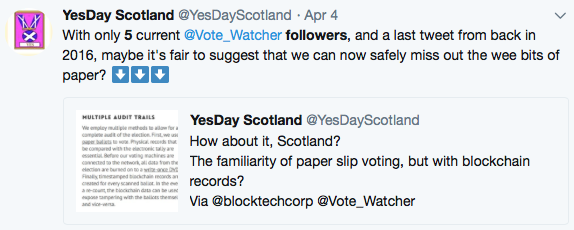
Very clearly, TOTAL DIGITALISATION is the way to go.
Conceptuals for Scotland’s blockchain democracy platforms:
Instead of having national debates based upon Westminster-style Punch’n’Judy TV debates, subsequently edited and further aired by state broadcasters, let’s bring a new dimension.
It would be much more relevant instead, simply to have a factual and inspiring online introductory film clip from Scotland’s First Minister. We do not need to see the case For and Against Independence, we do need to see the case stated as to WHY SCOTLAND SHOULD BECOME AN INDEPENDENT COUNTRY.
For Scotland’s Independence question via blockchain democracy, we do not again require the stated media-propelled opinions of English ‘celebrities’, enforced and driven upon Scotland’s citizens. David Beckham, John Cleese and Jeremy Clarkson would be better advised to keep their opinions on Scotland’s Independence, to themselves. After all, us Scots would never dream of telling our English neighbours how to run their country.
Social media from Scotland’s YES side seems to have broad consensus regarding Scots who previously held an inexplicable lack of faith in Scotland’s ability to manage Scotland as an Independent country. Instead of more of the same next time around, the likes of JK Rowling and Sir Billy Connolly would perhaps do better, both for themselves and others, to simply refer citizens to the factual information packs which form the blockchain online participant process. Happy Days, and no future stress, for all Scots!
Think of the 2014 system. People were asked to go into a polling booth and tick a wee box, based on what they’d seen The Rt Hon. the Lord Alistair Darling of Roulanish say on a TV screen.
Blockchain can remove bias, cronyism, and career politics. It replaces with facts, action driven for all of society, and politicians who can serve limited fixed terms, working purely 100% for their communities.
Talking of the House of Lords, our thanks as always to Scotland’s unofficial election cartoonist @ARTofPatt – on twitter today as @OorJoe
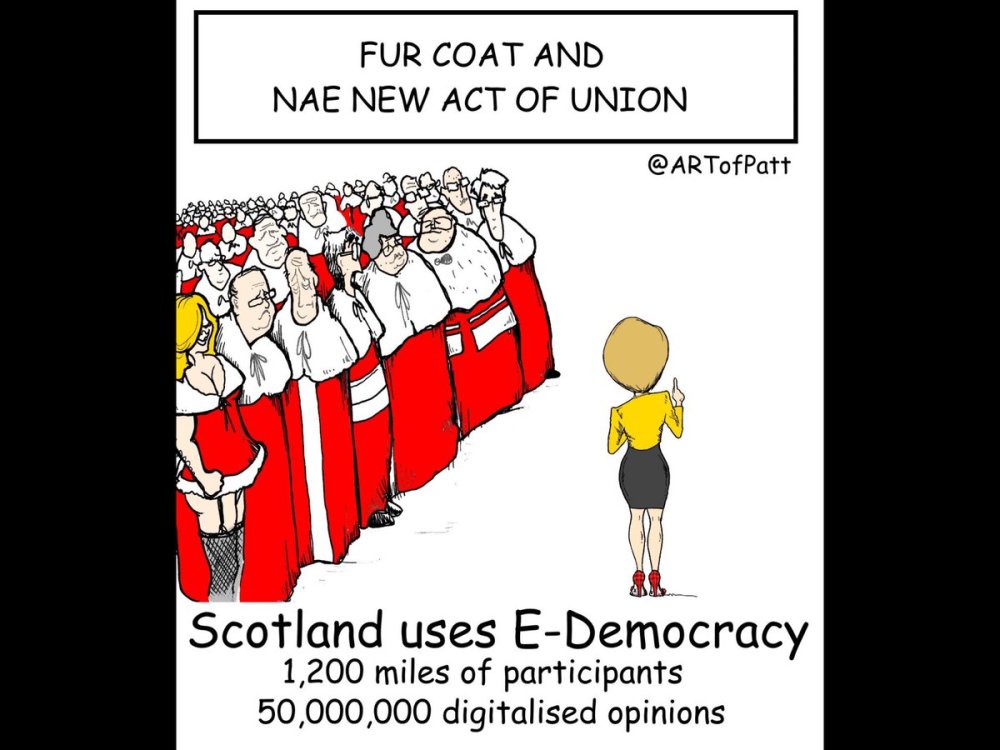
In technological terms, we need:
– Standalone zero bias, bespoke design blockchain sites, underpinned with relevant constitution, governed here in Scotland
– Fully regulated government compliance
– Full digital ID interface in conjunction with ScotGov
– Based on facts, underpinned by Ethics committee
– Distilled White Paper information packs, factually outlining the subject matters, compulsory download as part of every participant process
– Film clips covering subject matter
– Audio translate
– Latest and ongoing cryptography security via Edinburgh University Blockchain academics: niche expertise, lasered into showcasing their newest levels of innovation
– GDPR compliance, user tickbox consent
– Electoral roll interface with Saltire National Entitlement Cards, for all eligible participants
– Accumulating visible statistics
– Tentative and switchable vote capabilities
– Live, location-based geographical mapping, drilled into all locations – here’s the demo
– Total social media share capability
– Contracted-in specialised ‘awareness’ social media digital services, compliant with ICO and GDPR
– Permanent digitalised records tested, with absolute end verifiability, via UN inspectors
Today, Scots therefore now have a chance to redefine new possibilities and a better modern democracy, arising especially as a result of blockchain capability. So, all best wishes to those involved within the Scottish government, with all the forthcoming digital trials.
It has been great this week to note the beginnings of #TheStreetProject
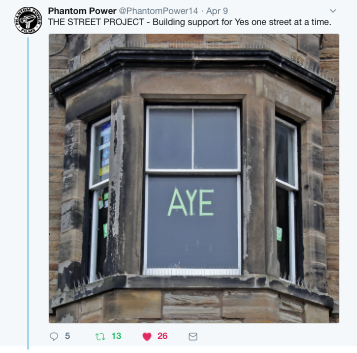
Instead of repeating 2014 and seeing most of the 800,000 non-voters remaining non-voters – #TheStreetProject and its many other equivalents can bring so many more people into the decision-making process. By people, for people.
The 5 part equation for Independence is easily stated:
One incredible strategic plan from Scotland YES at government level + #BlockchainDemocracy + #TheStreetProject + Epic Graft from YESSERS + the finest community activism ever seen in Scotland = Independence.
Scotland can do all of these things, and all the rest. But it’s only ever going to happen, if people actually make it happen. The harder that YES works, the luckier that YES gets.
Very much hoping that #BlockchainDemocracy will be introduced, enabling Scotland’s future to be determined by facts and truth, then allowing the existing division and mass conflict to be resolved within our society, using this new modern technology.
Each of us who is personally a YES for Scotland Independence can acknowledge that the value of our opinion is approximately 1 divided by 4,400,000 other Scots – and we also recognise fundamentally, that #BlockchainDemocracy, and those who create it, are obligated to apply zero bias. Based upon Pi, and applied to Scotland Independence, the No remains as an absolute constant until, and only if, a majority is reached!
Our twitter has focussed on global digital democracy. There are many other twitter feeds, focussed on explaining the many benefits of becoming an Independent country.
YesDayScotland has never seen Independence as some form of Endgame. It’s actually more relevant to envisage it Independence created by #BlockchainDemocracy, as a new beginning.
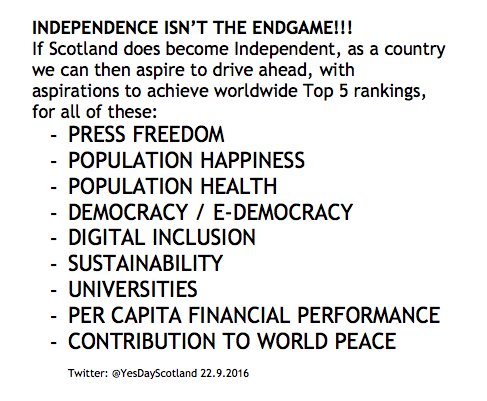
Scotland apparently has many citizens who will always wish to be Unionists, 600,000 is the figure we’ve always considered. 11% of Scotland’s 5.4M population.
Each obviously to their own opinion, however it can certainly be pointed out to these 600,000 people, that being in a Union such as that which Scotland finds itself in today with Westminster, is not normal. To the contrary, it is absolutely abnormal. It is however, totally normal for a country to be independent.
Our twitter refers again and again to a key fundamental – Scandinavia. It’s certainly the case that if Scotland’s 2014 wealthy No voters all jumped on a plane for a 1 hr flight to Copenhagen, Oslo or Stockholm, and saw the reality with their own eyes, they would then become YESSERS!
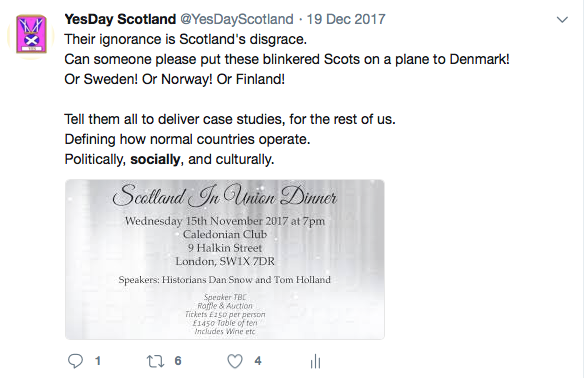
To reiterate, Blockchain’s vote process has information packs, which can help to truthfully educate people as to the facts, with relevant comparisons. Education is key.
If you were a 2014 No voter who has never visited Scandinavia, and you have no inclination to do so today, we can save you the bother.
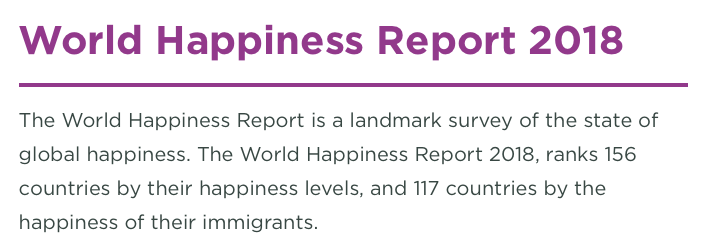
We visited Copenhagen in 2016, and then delivered a 3,500 word Case Study defining why that city is regarded as the happiest city, within Denmark, the 3 time winner of the world’s happiest country. We considered what Scotland could do, to emulate that incredible success, and we concluded:
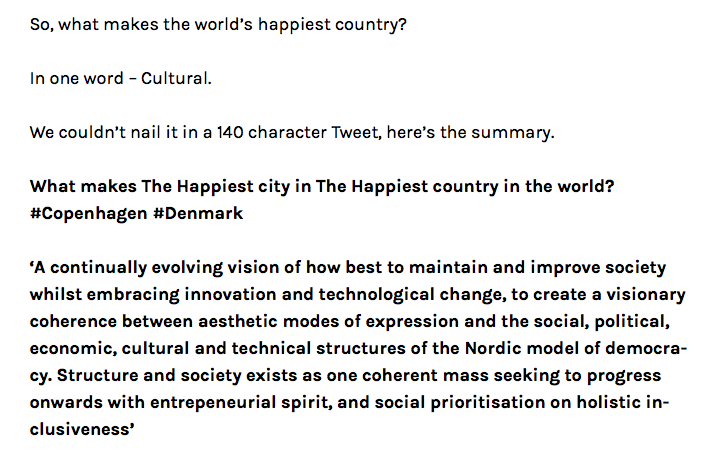
A key issue for Scotland and Independence, is that Unionists are self-preservationists who place their ‘apparent beliefs’, above the very real present day requirements of fellow citizens. That, is the opposite of Scandinavian mentality, whereby affluent citizens are mostly driven to do all they can for their fellow citizens.

On 6 different occasions, our twitter has asked social media, for Scots to specify the positive case for the Union. We confirm today, that we have not had one single response, from one single source.
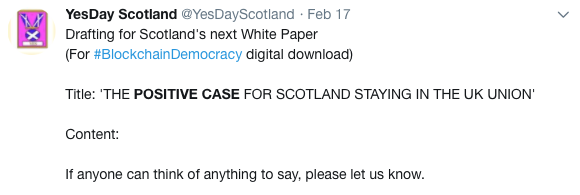
There is one further small segment within Scotland which is very difficult indeed to comprehend, that of the herd mentality of knuckle-draggers making decisions on a country’s entire future, based upon their affinity, with their football clubs. We’ve talked with many Scandinavians about that, and all they can do in reply, is laugh. If it were not so inexplicable, it would perhaps be funny for Scots as well. Only one thing will resolve, and it’s education.
So, let’s move onwards:
If blockchain is to be used to measure desire for Independence, there is no necessity for a defined POPULATION majority, which would equate as more than 2,200,000 votes.
A digital referendum calling for YES and No votes could simply deliver a reverse of the 2014 results, with eg 2M YES and 1.6M No – so YES would prevail with 200,000 fewer votes, than a population majority.
DISTORTION AND LIES FROM POLLING COMPANIES. Unionist-owned polling companies keep telling Scotland today, that desire for Independence is under 50%? They do this by applying bias, skewed wording, and selective questioning. Let’s cut through that unseemly mess, and consider some facts. In 2014, the difference between YES and No was ballpark 400,000 – and we are not aware of many YES to No switchers since then! Since 2014, each year circa 57,000 older Scots are very sadly no longer with us. Each year circa 55,000 younger Scots have become old enough to vote. Older Scots were massively aligned to No in 2014, younger voters vice versa. If you run the figures simplistically, that puts YES at ballpark 50%, before any campaigning even begins, let alone before adding the additional potentials arising from #BlockchainDemocracy.
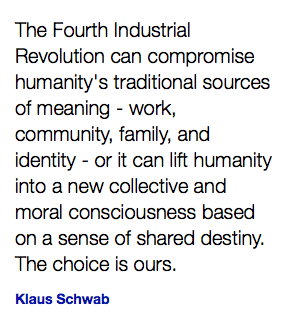
Our twitter can’t take anything specifically further for Scotland, the Scottish government needs to step on up, and do what needs doing.
We’ve created and used this image on twitter:
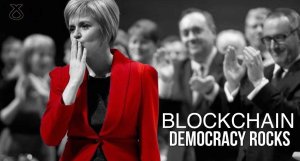
As well as calling on the Scottish government to enable a new department for #BlockchainDemocracy, it’s relevant today, to say that Scotland’s YES now needs to step forward to the digital line, absolutely ruthlessly committed to doing all possible to totally support our FM, if indeed the decision is taken to proceed with digital. We are, after all, fighting for an independent future for our future generations.

So, if you share this aspiration for a new future of direct digital democracy – go message your MP, your MSP, your MEP. Your local YES hub. Your local newspaper! Your social media. All YES websites, all YES platforms. Tell them that we refuse to be held to further account by an archaic, twisted, Tory-controlled referendum process. Tell them that we want modernisation, inclusion, and increased democracy. And we want it all properly controlled, right here in our own country, Scotland.
It’s been the honour of a lifetime to track and collate direct democracy potentials for all fellow Scots, over the last 4 years. 50,000 tweets and 60 wordpress articles on a journey of discovery.
At peak, after Scotland’s SNP party had turned down our initial Policy Submission suggestion, our twitter accelerated into 1,000,000+ monthly impressions.
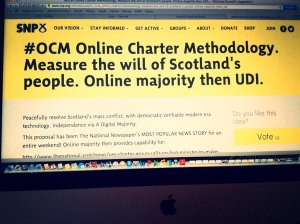
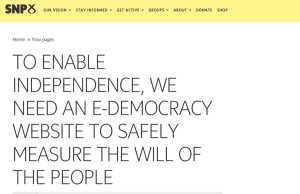
There was no mainstream media, no visible politicians, it was all driven by us ordinary Scots. Sincere gratitude as always, to everyone who has contributed. Clearly, everything in these regards has been driven by a collective love for Scotland, and an absolute belief that we can do so much better with future democracy.
Or, as our Scottish (Belgian-based) twitter pal @delboy1978uk was keen to point out, with a quick burner for the ‘Patriot’ architect guy who was in charge of 2014’s #BetterTogether No campaign:
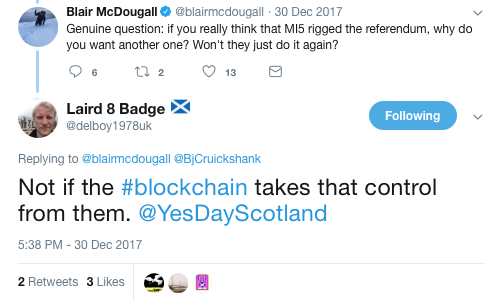
Yep! It’s easy to take a vision that enabled by technological progress, Scotland’s digital revolution could perhaps become citizen-led, however today, our government has the most amazing opportunity to emulate what has already been achieved elsewhere, and then to lead and inspire our new democratic future.
Remember that Scotland’s digital revolution is what’s important, and each one of us, alone, is worth nothing.
Each academic we’ve listened to. Each YES politician we’ve listened to. All have shared the belief that digital has such incredible potential for the future. Full support to everyone tasked with bringing it together.

I told you, nearly 8 million!

Wishing all fellow Scots, all the best with the new future for direct digital democracy.
Nicholas Russell, on behalf of all community in and around twitter @YesDayScotland
12.4.2018
Viva la Revolution
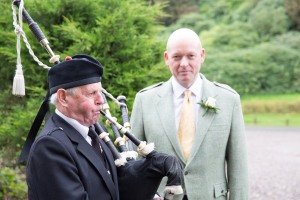
Best wishes from Scotland
ADDITION 18.4.2018 – 11 days after publishing HOW TO CREATE ONE MILLION NEW SCOTLAND YESSERS, and 6 days after publishing the Case Study which you have just read, it’s with absolute joy that we are able to bring you one brand new article which published yesterday.

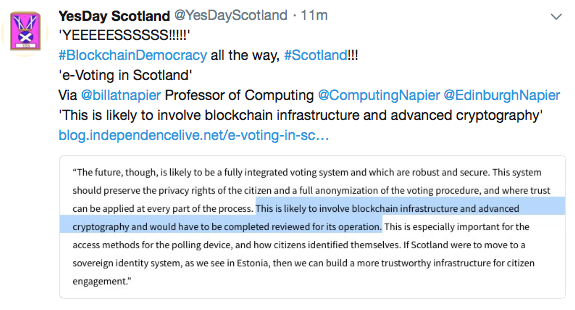
In relation to Scotland’s democracy, it’s the first ever mention we’ve seen in any Scottish media in these contexts for ‘blockchain infrastructure and advanced cryptography’. e-Voting in Scotland – as you have never seen before! All best wishes to everyone on twitter @liveIndyScot
Oh Yeah. One final point for our government. If you are going to ask Scots again, if we all wish to live in an Independent country – please can you at least tell everyone as part of the blockchain process, if the result is a YES – our children will get to run THE FLAME OF INDEPENDENCE, across all of Scotland. Participant submission via blockchain, winners via random digital generation! It is, after all, their future.
Thanks!
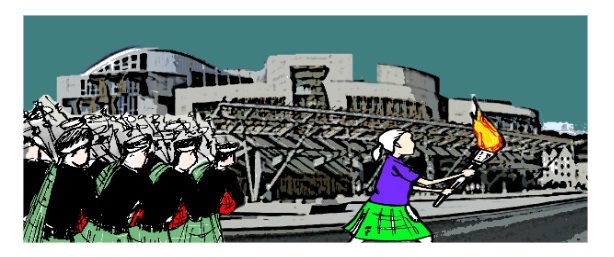
Links to all related substance, highlighting:
2017 Scottish Government Digital Strategy:
http://www.gov.scot/Publications/2017/03/7843
Estonia, digital:
Estonian Blockchain Technology:
https://e-estonia.com/wp-content/uploads/faq-a4-v02-blockchain.pdf
Zug to use Blockchain for Citizen ID:
https://www.finews.com/news/english-news/28087-zug-to-use-blockchain-for-citizen-id
2018 submission, ScotGov Public Consultation on Electoral Reform:
DigitalScotland: Blueprint for Blockchain Digital Democracy:
http://digitalscot.net/library/ebooks/blockchain-blueprint
(24 page PDF download)
‘Patriot’ – French Journal of British Studies
https://journals.openedition.org/rfcb/418
’21st century citizens, interacting with 19th century institutions, via 15th century paper-based voting systems’
How Blockchain technology can transform voting in Scotland:
http://www.businessforscotland.com/blockchain-technology-can-transform-voting-scotland
Scottish government Public Consultation on Electoral Reform, electronic democracy trials confirmed:
https://webrootsdemocracy.org/2018/03/28/scottish-government-e-voting-pilots-will-go-ahead
Crimestoppers UK 2018 ‘bribery, intimidation and impersonation’
2014: Judge Richard Marvey, postal vote fraud … ‘on a industrial scale’
2018: Westminster MP’s campaigning for political parties not to be held to account by 2018’s new GDPR data laws:
https://digit.fyi/data-protection-political-parties
Edinburgh University Blockchain Technology Laboratory:
Blockchain academics define a new future for democracy in Scotland:
http://www.businessforscotland.com/blockchain-academics-define-new-future-democracy-scotland
and
YesDayScotland
4 years of charted progress, 60 articles summarising the evolution of global direct democracy, and emerging blockchain democracy: https://yesdayscotland.wordpress.com
YesDayScotland – the world’s first global blockchain democracy trials:
https://coinidol.com/boule-ico-launches-with-alpha-platform-success
Scotland – Saltire National Entitlement Cards
https://www.entitlementcard.org.uk
Youth-specific: https://www.youngscot.net
Plans in progress, capability to issue entitlement cards to all Scots who do not yet have one:
Scottish Government Digital Directorate
http://www.ukauthority.com/news/7771/scotland-to-get-its-own-system-for-online-id-assurance
Scotland’s 2016 National Survey:
http://www.bbc.co.uk/news/uk-scotland-scotland-politics-38164409
In numbers, 2014’s referendum: (Noted, there were circa 140,000 unregistered voters)
https://en.wikipedia.org/wiki/Scottish_independence_referendum,_2014
Two Scotland companies with Blockchain capabilities:
Scottish government public infrastructure blockchain partner:
Edinburgh’s https://www.wallet.services
and:
Ayr’s https://maidsafe.net
Scotland’s 1,400+ member Blockchain community:
https://www.meetup.com/Scottish-Blockchain-Meetup
Digital Exclusion in Scotland:
https://digit.fyi/report-finds-digital-exclusion-is-still-a-huge-issue-in-scotland
Scotland’s People: Results from the 2015 Scottish Household Survey:
http://www.gov.scot/Publications/2016/09/7673/9
Norway’s 96% digital inclusion:
https://helenmilner.com/2015/05/27/the-scandinavian-digital-inclusion-experience
Blockchain’s visible statistics, with tentative and switchable vote capabilities:
https://www.youtube.com/watch?v=EE2mWoio7po
Live, location-based geographical mapping: Scotland 2017 Demo:
[1] Any voting system for Government MUST not exclude those who are digitally illiterate and cannot vote/will not vote using a digital system for such elections. An alternative means of secure voting therefore requires to be offered to such persons with any paper based ballots completed being retained for possible further investigation for a minimum period of 2 years or until 6 months after conclusion of court appeals, whichever is the later. [2] Compulsory voting for all with an additional vote “box” confirming “non of the above” and that the voter is content with the outcome. [3] severe penalties for not voting [4] should the outcome of the ballot result in “non of the above” proving to be the most popular, or being involved in the result in a PR system, then the election process to be re-run with non of the original candidates on the ballot. In this instance, there could be a case made for NOT announcing the results of successful candidates prior to the re-run. [5] All voting to be conducted under regulation by Holyrood Officers, AND NO OTHER ORGANIZATION INVOLVED.
LikeLike
Reblogged this on Ramblings of a 50+ Female.
LikeLike
Facebook will sell it anyway. I would like to have both ways of voting and that would let us see if there was any count fiddle going on. That is if there is a big difference.
LikeLike